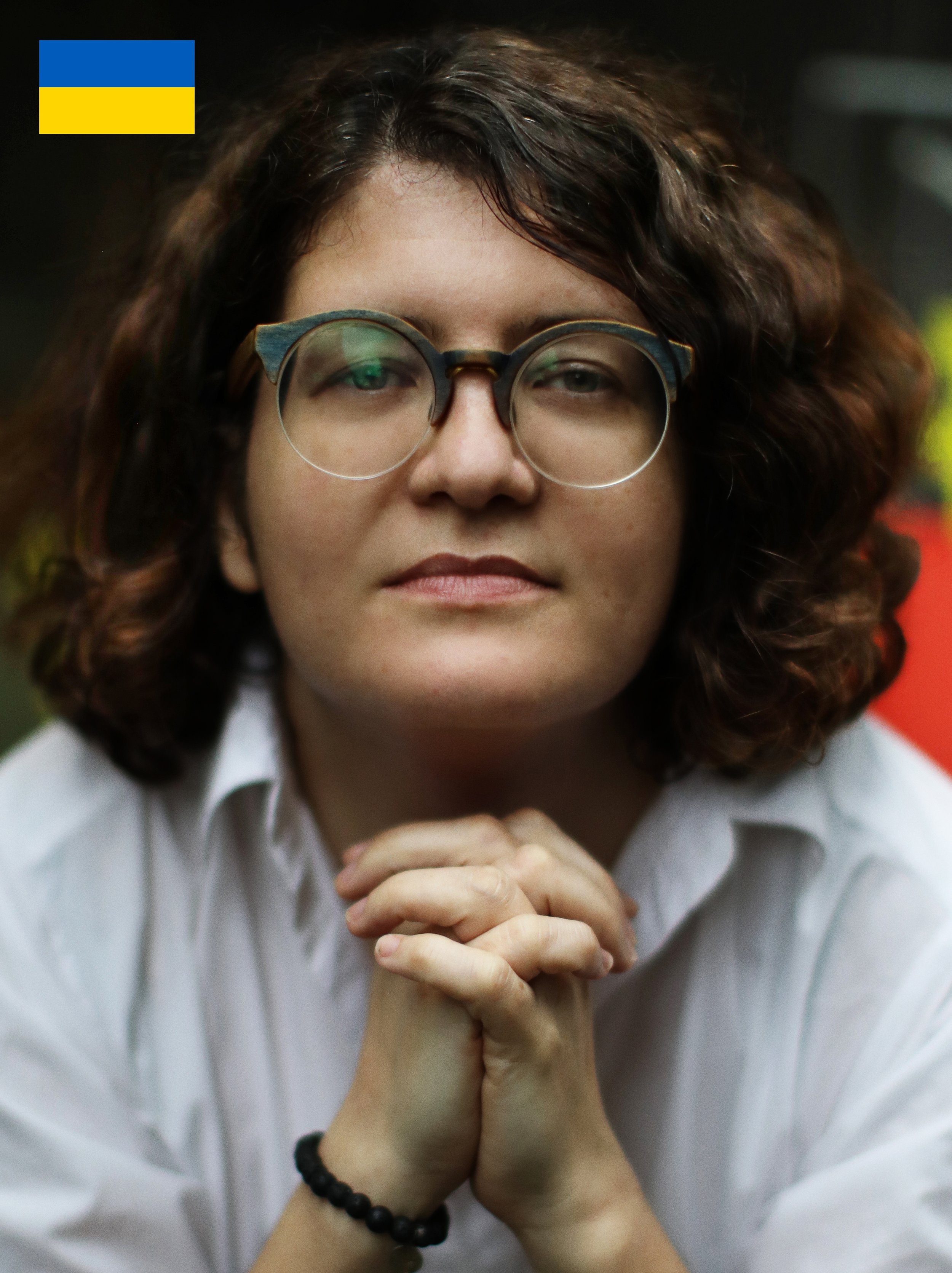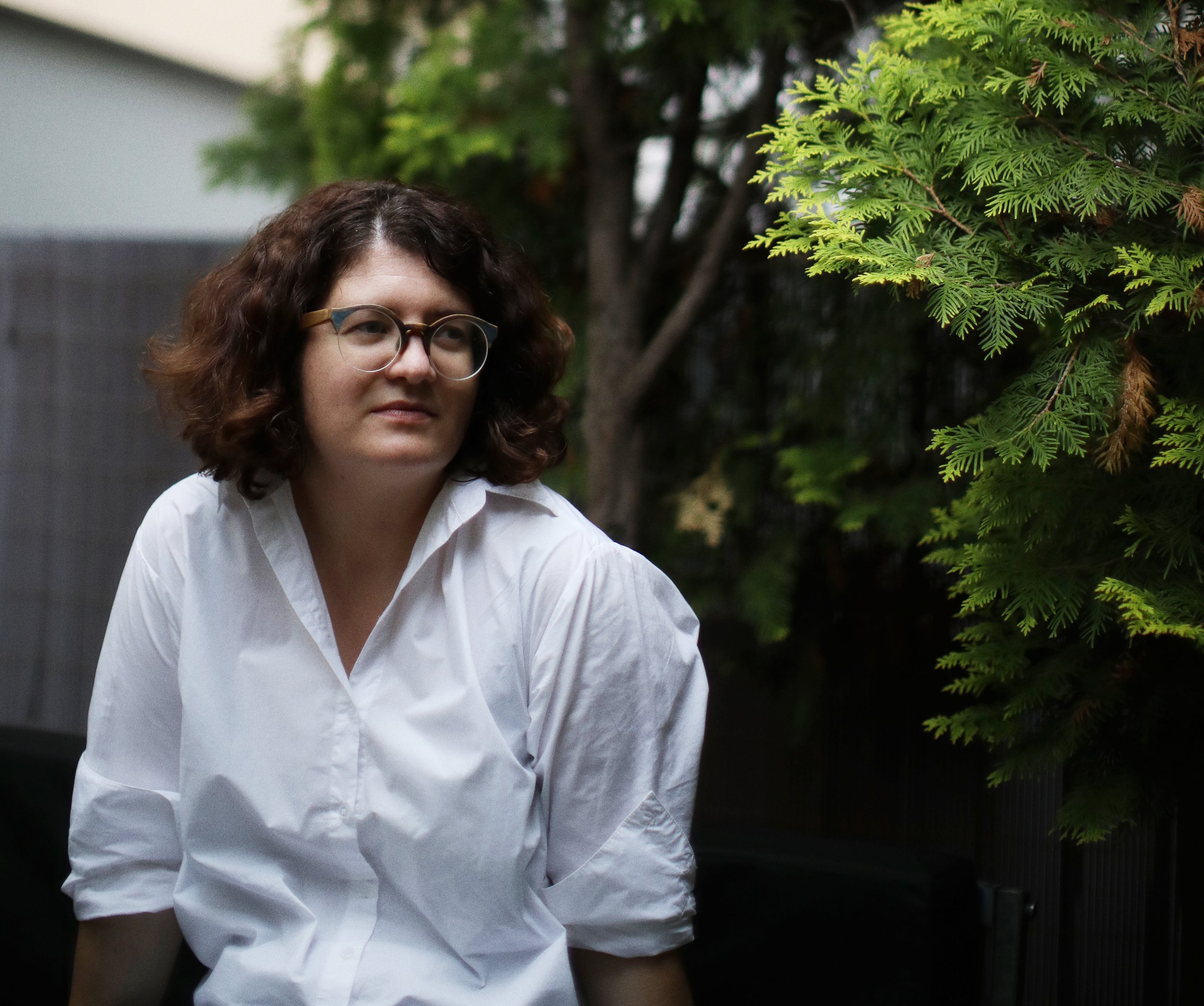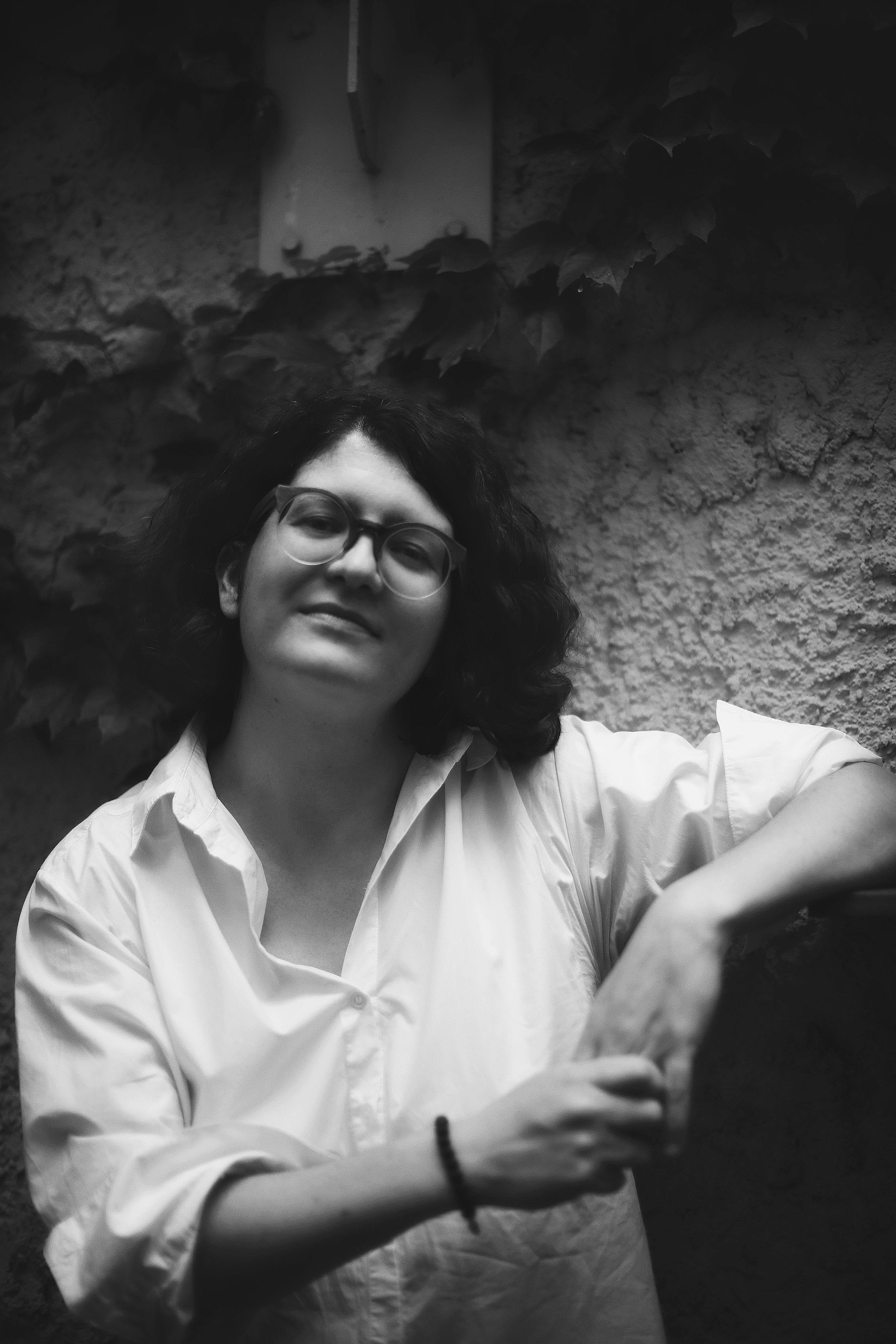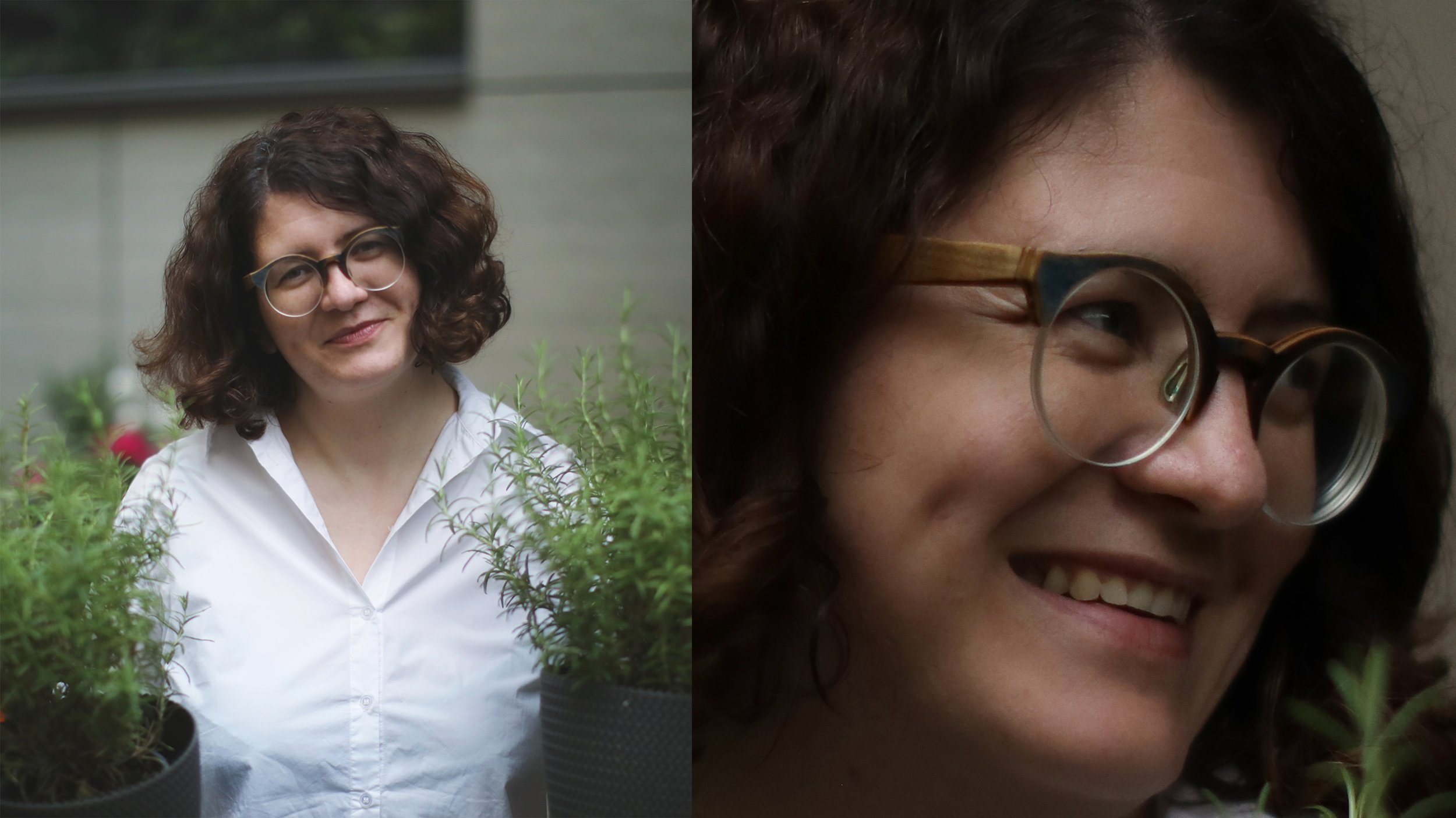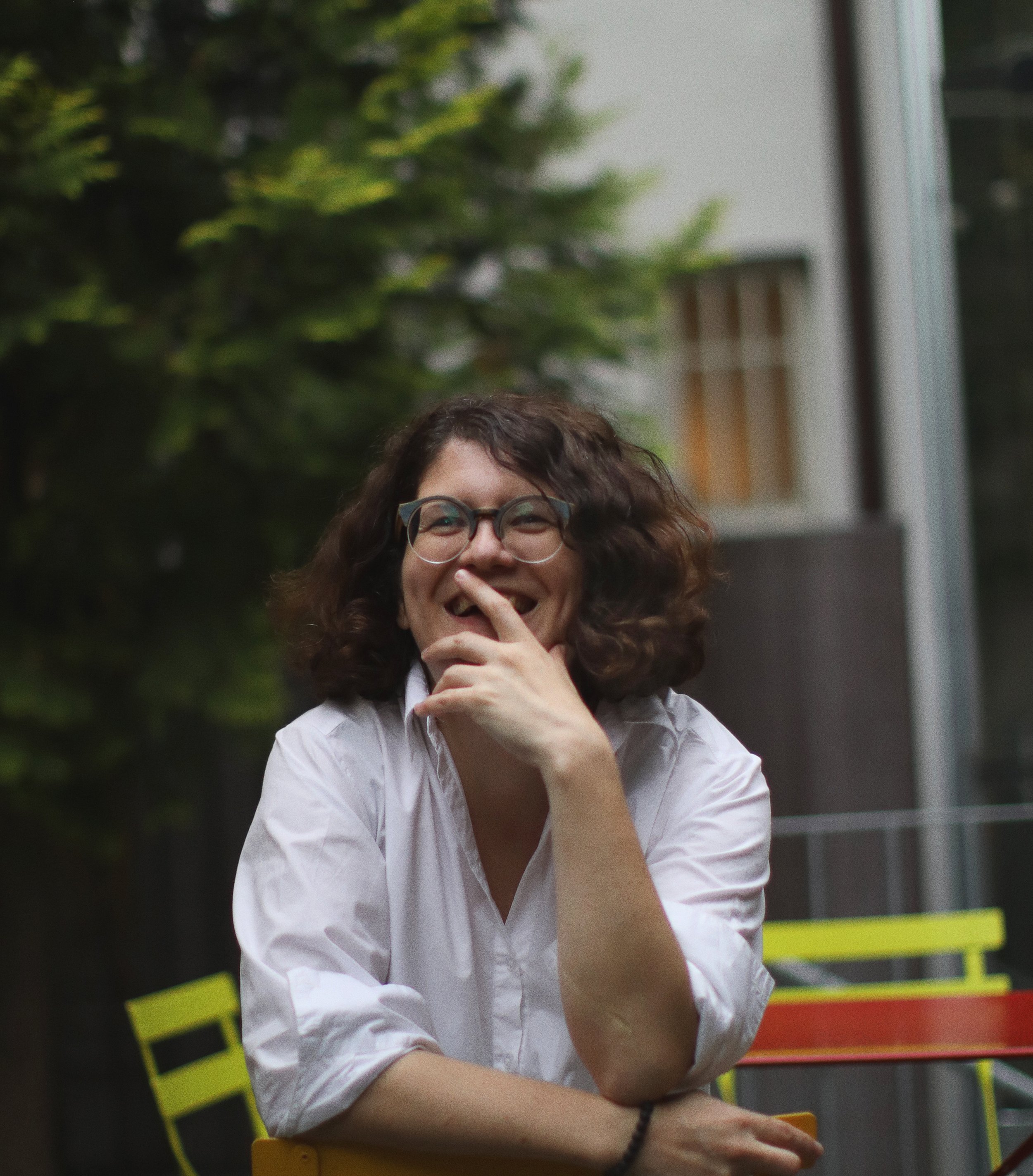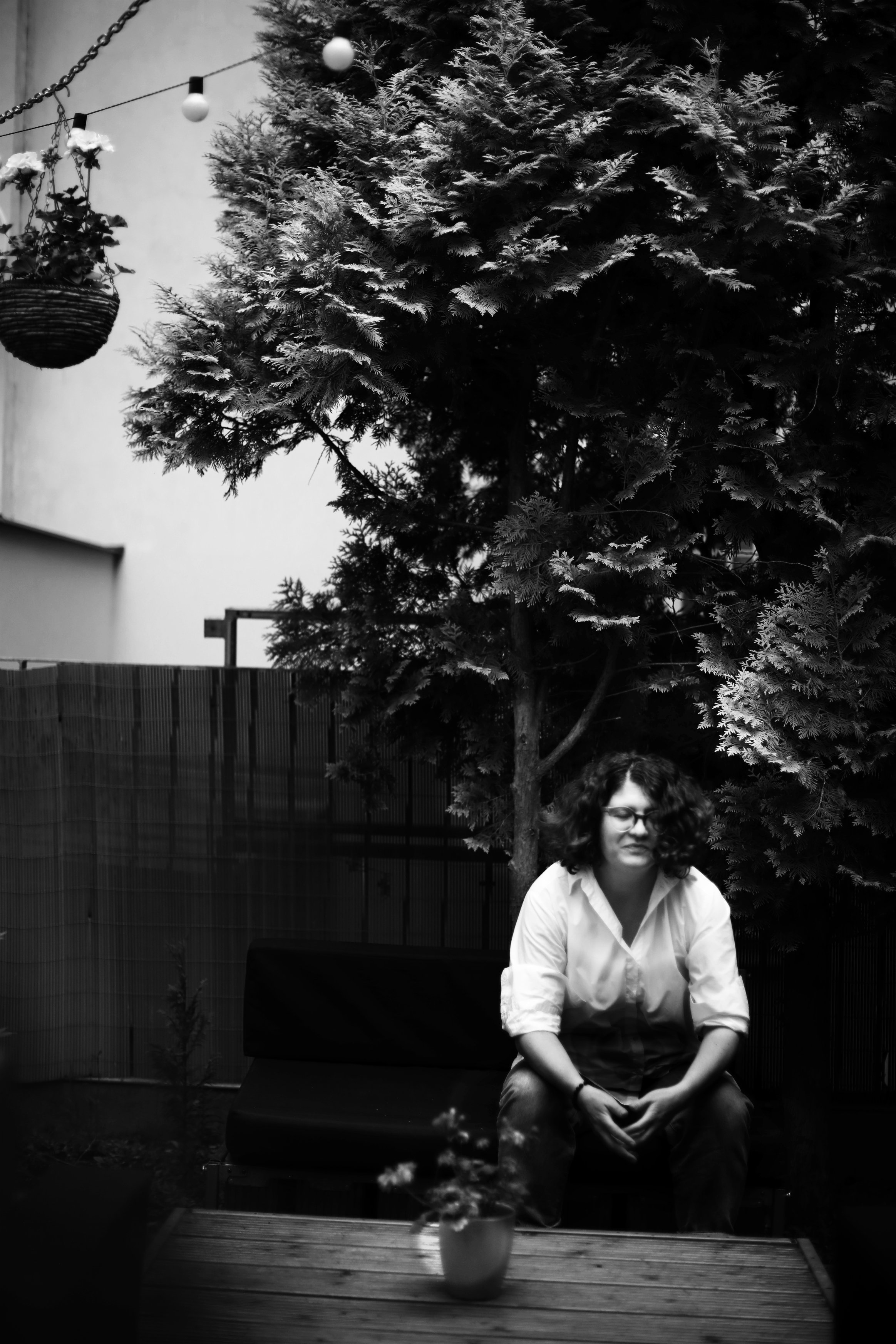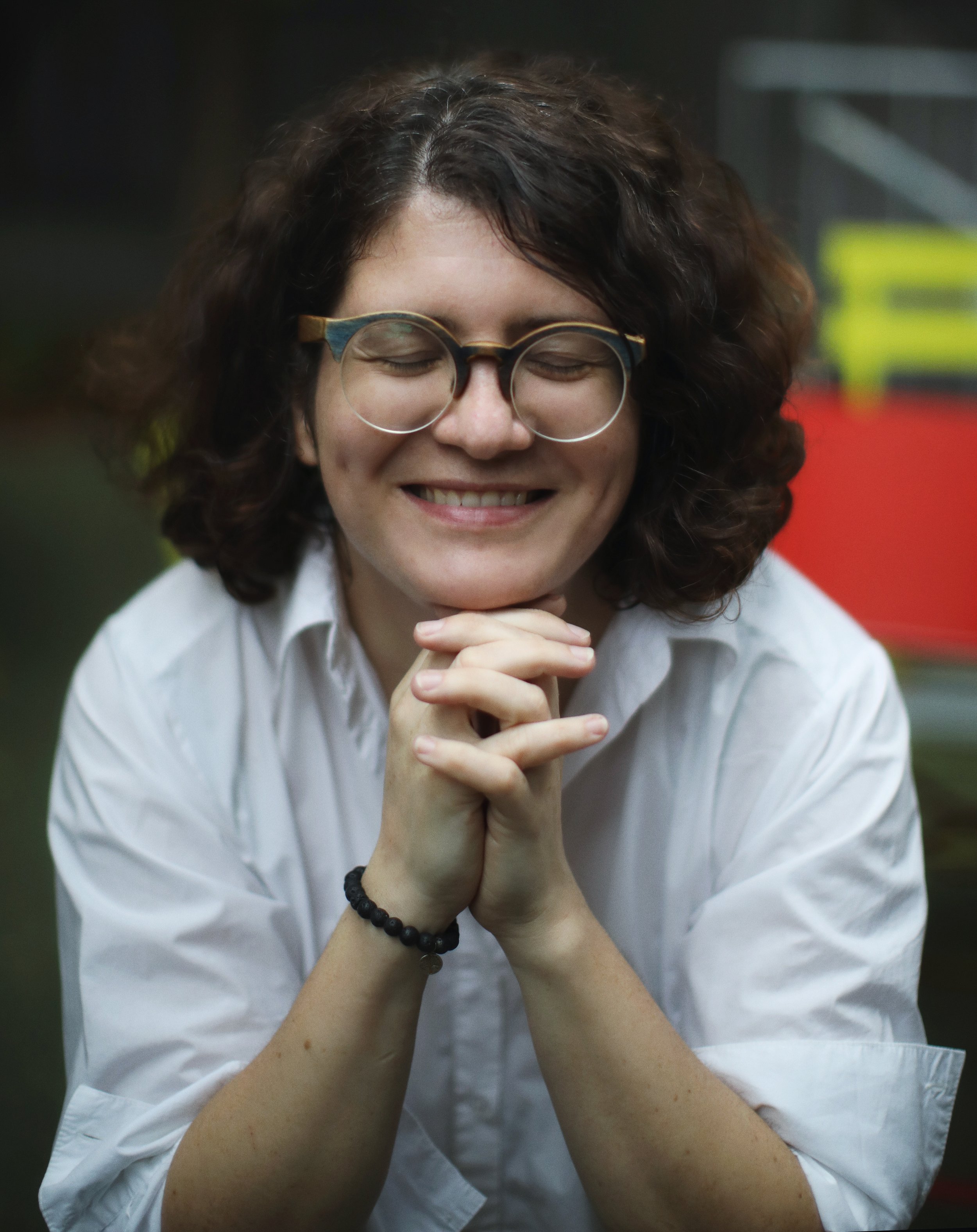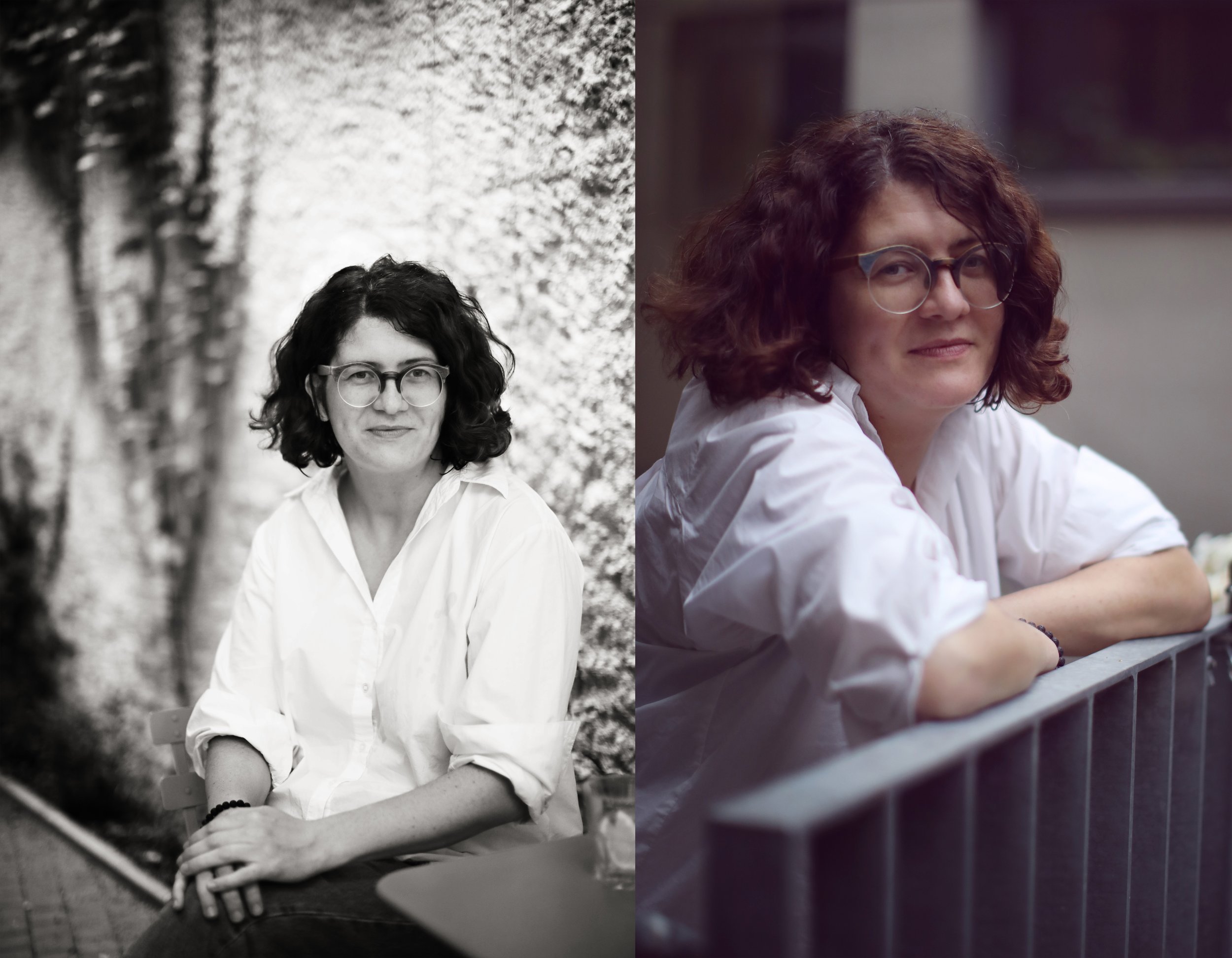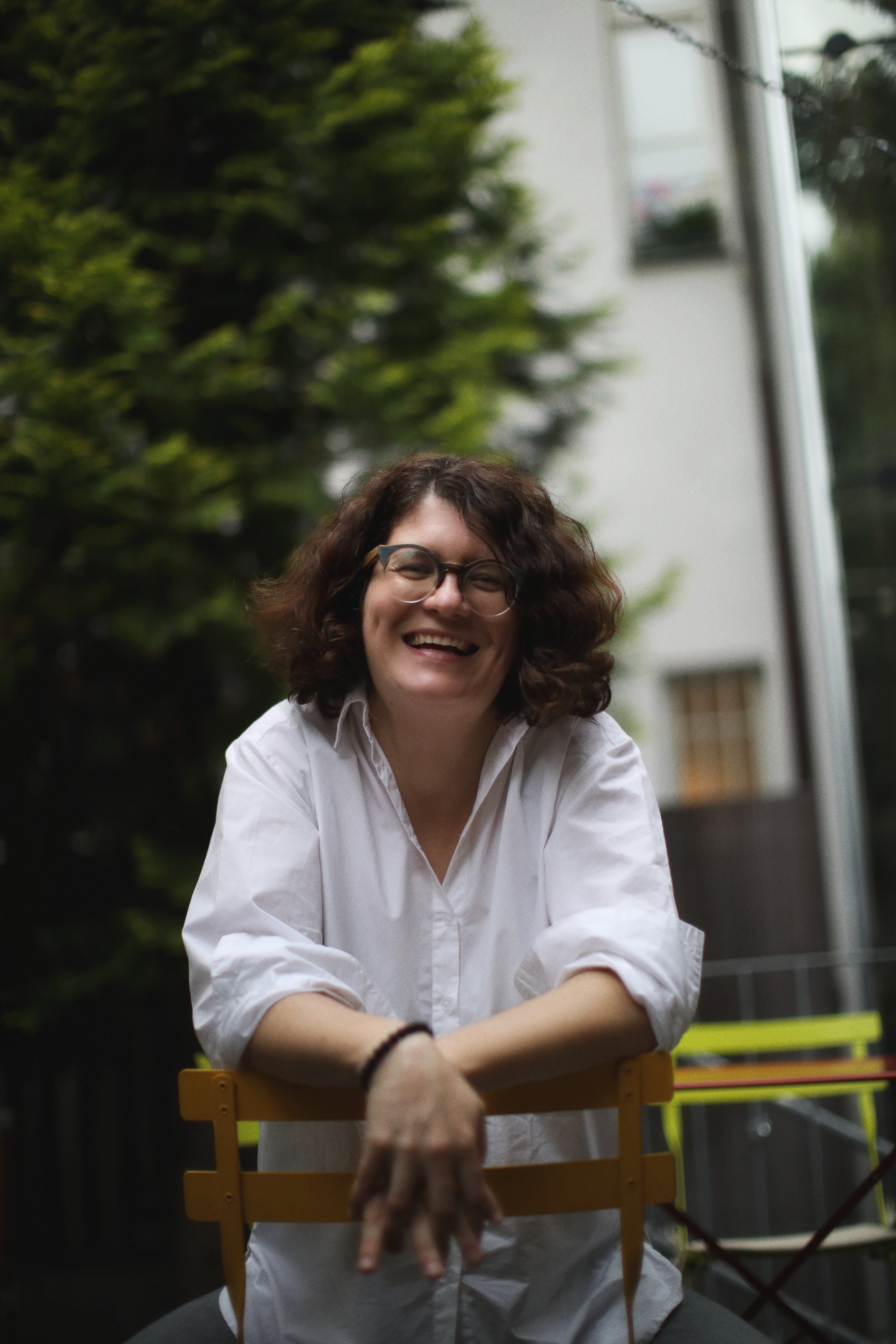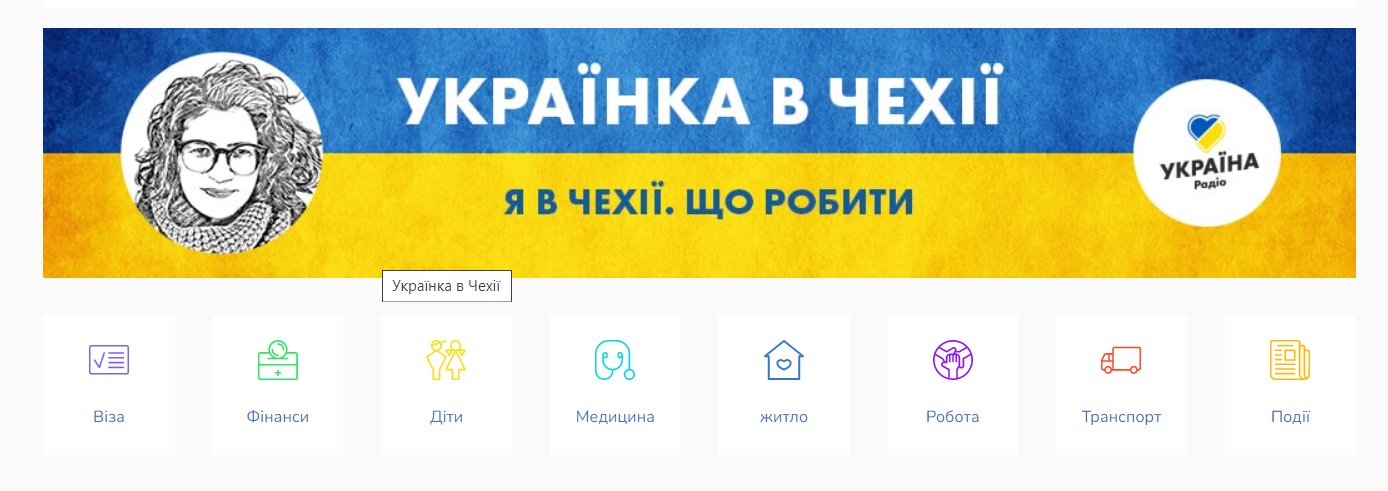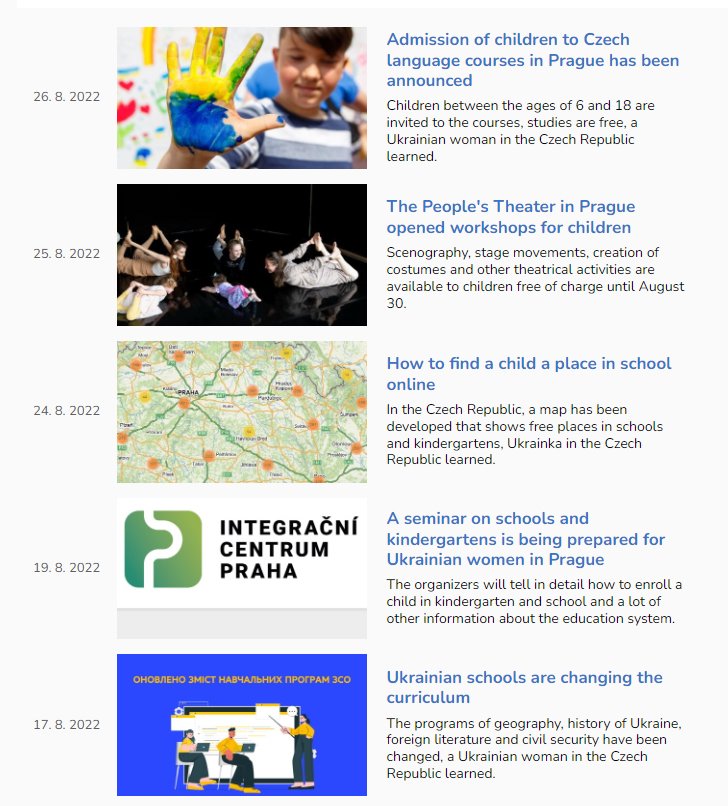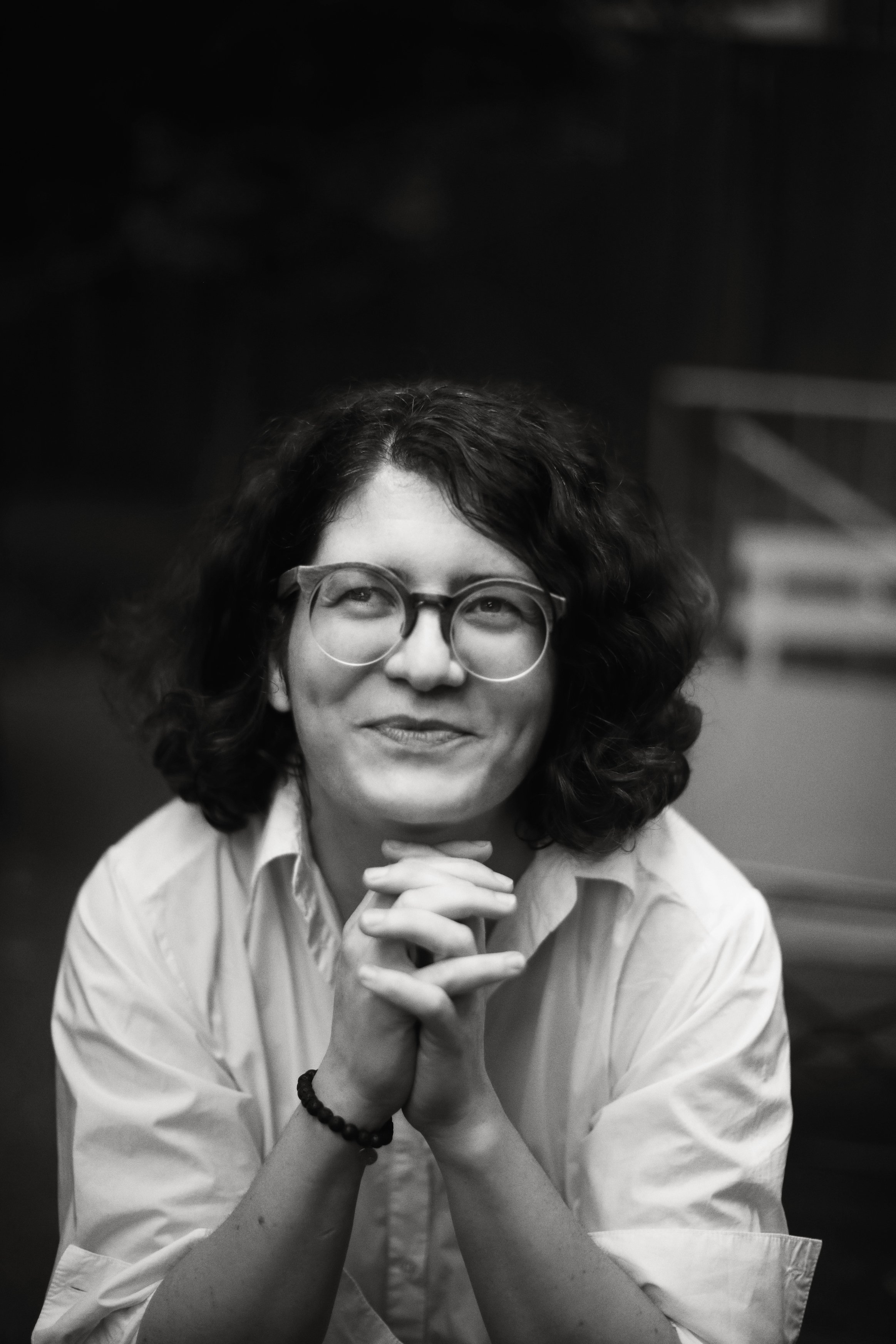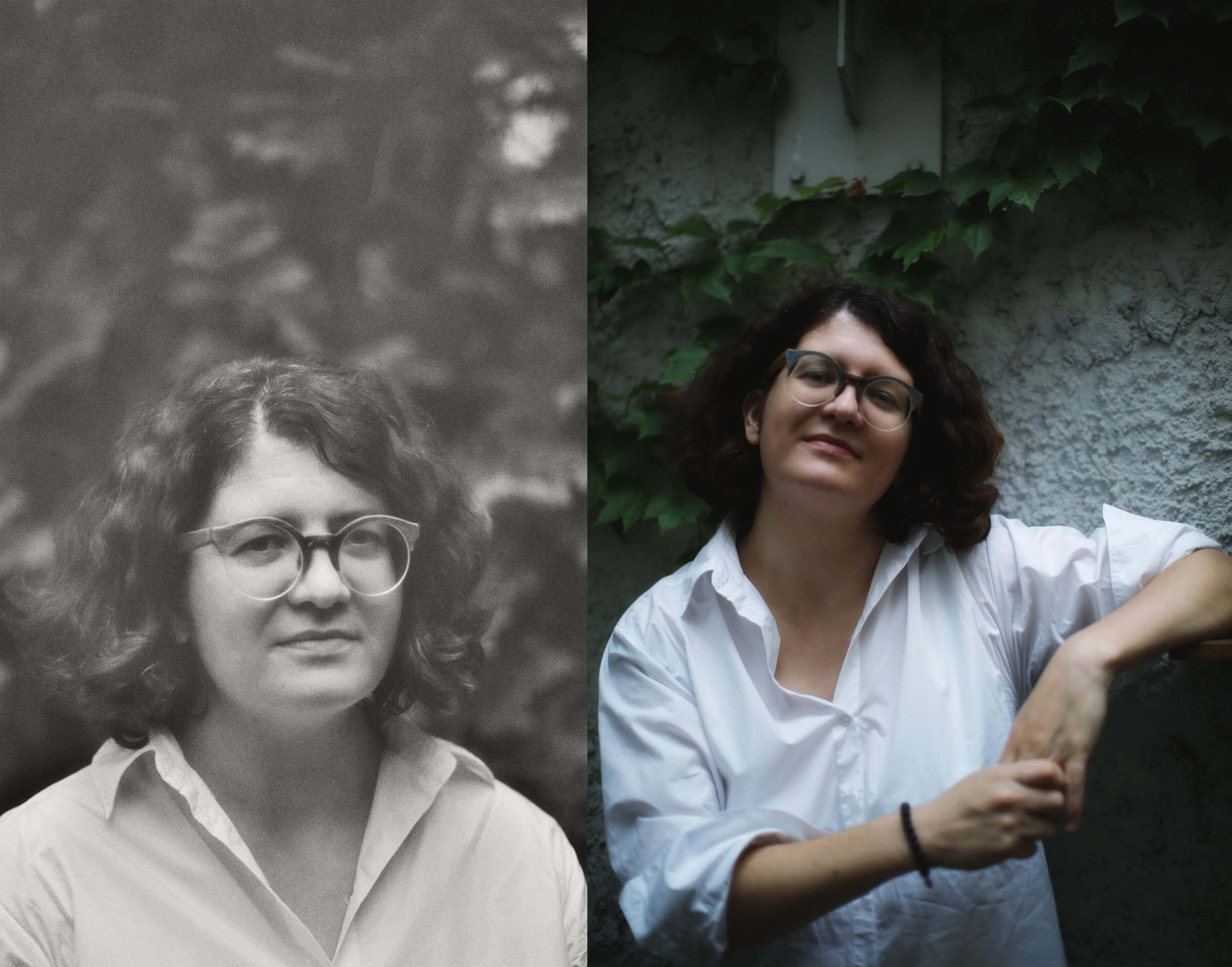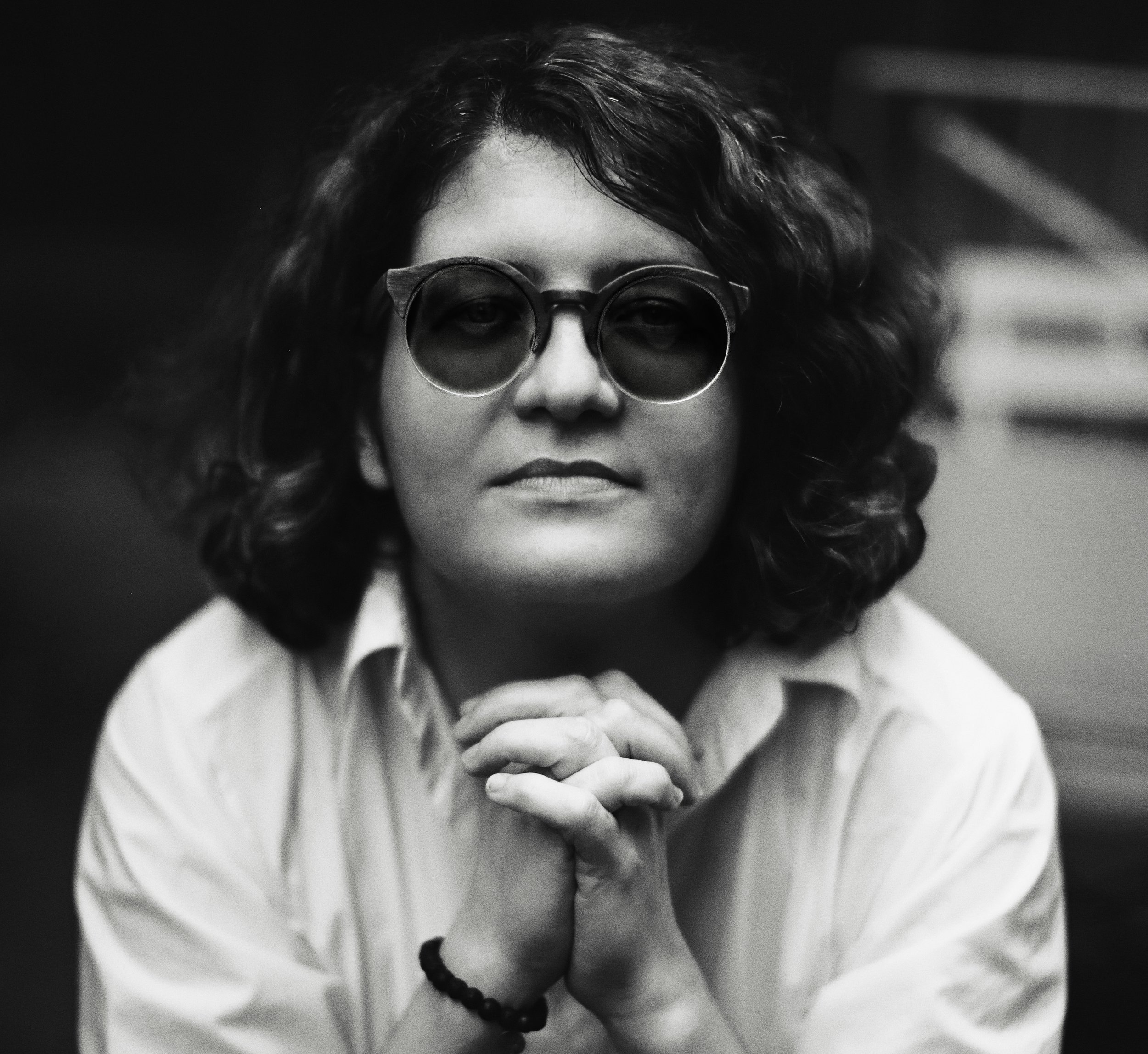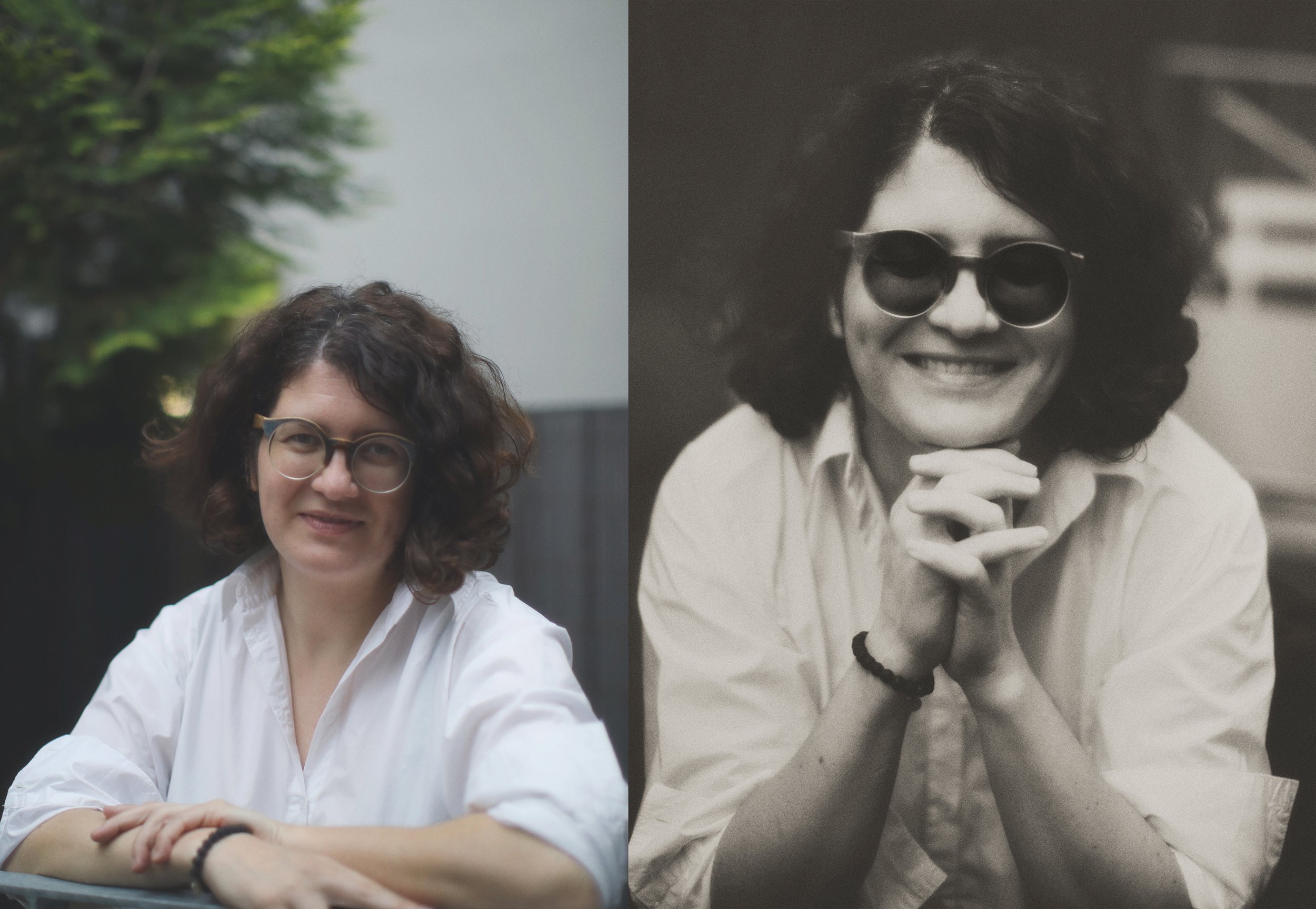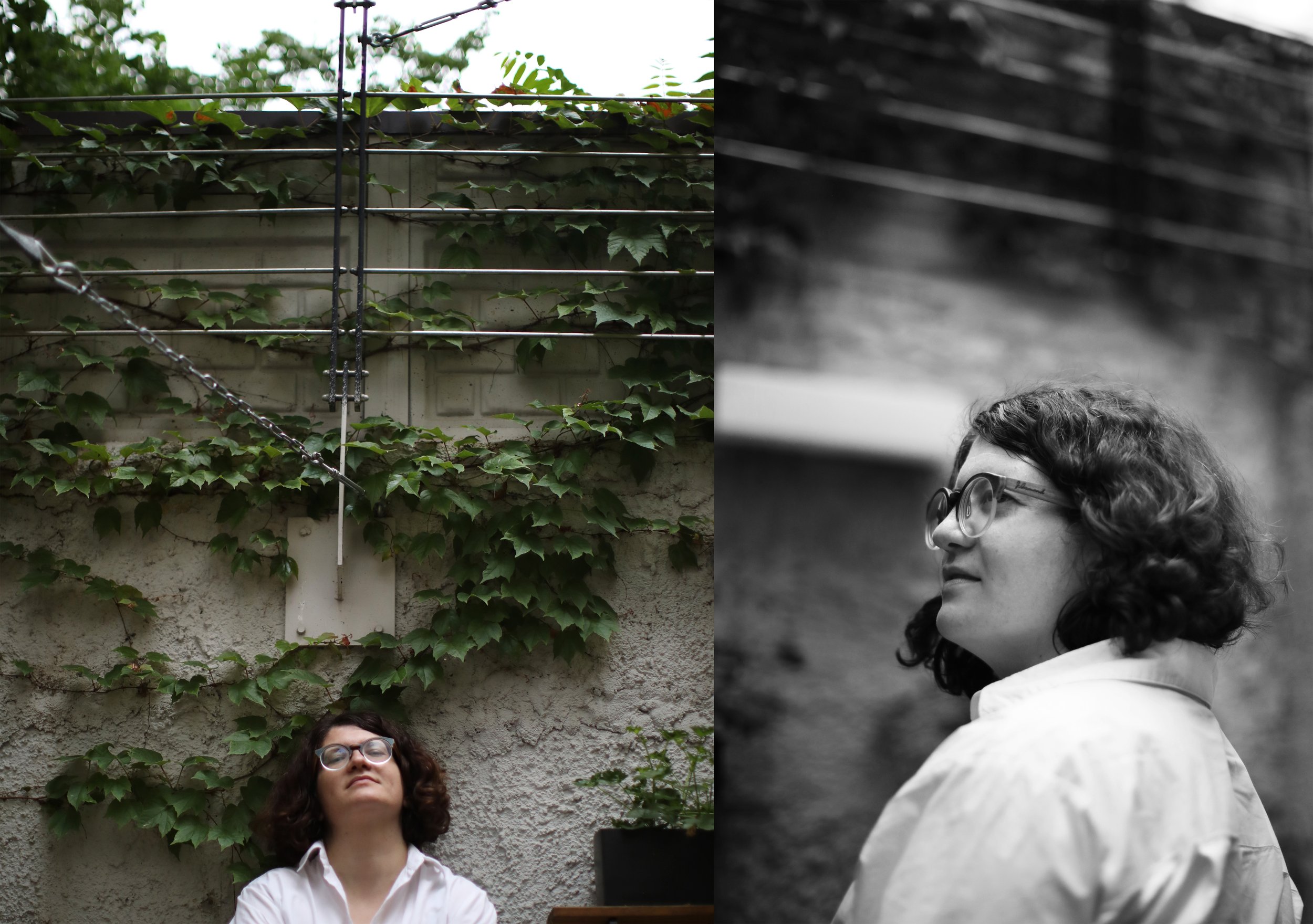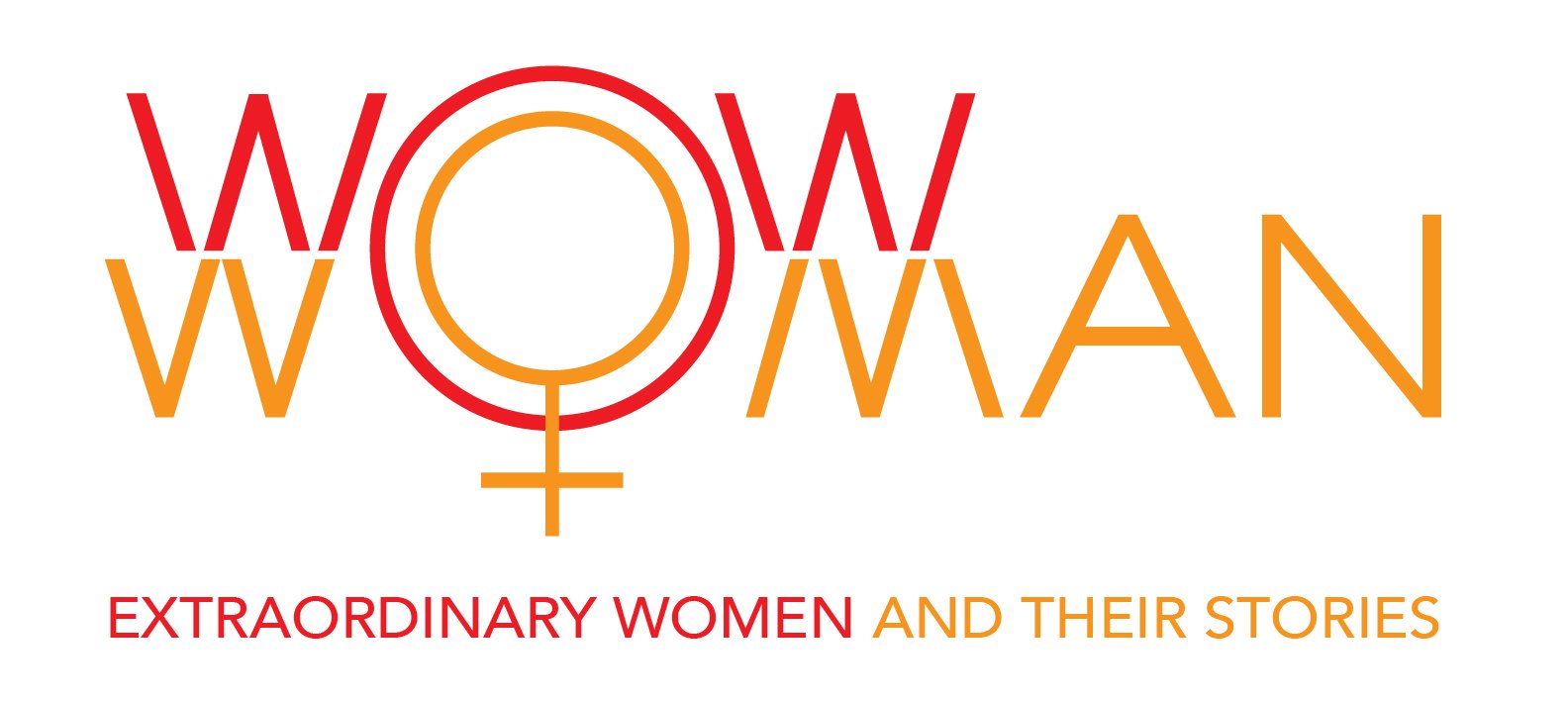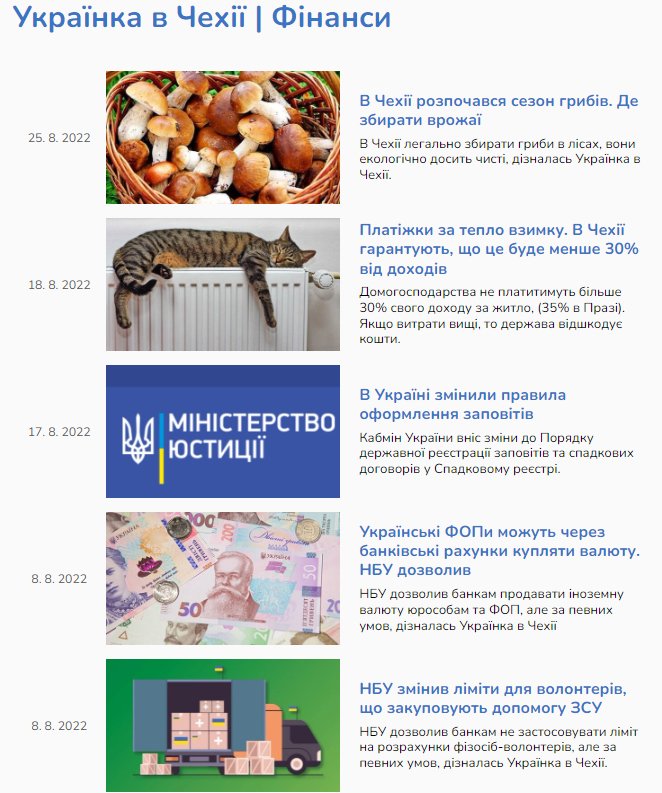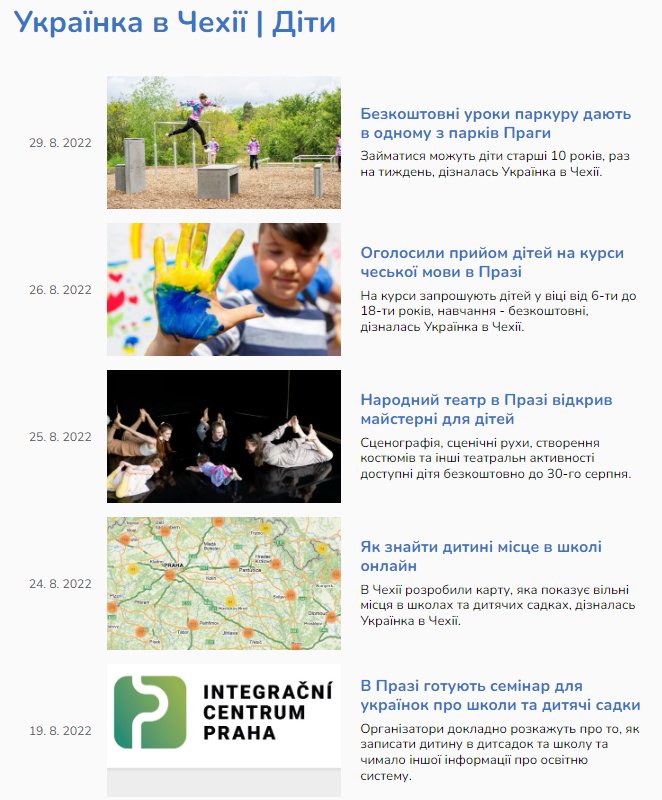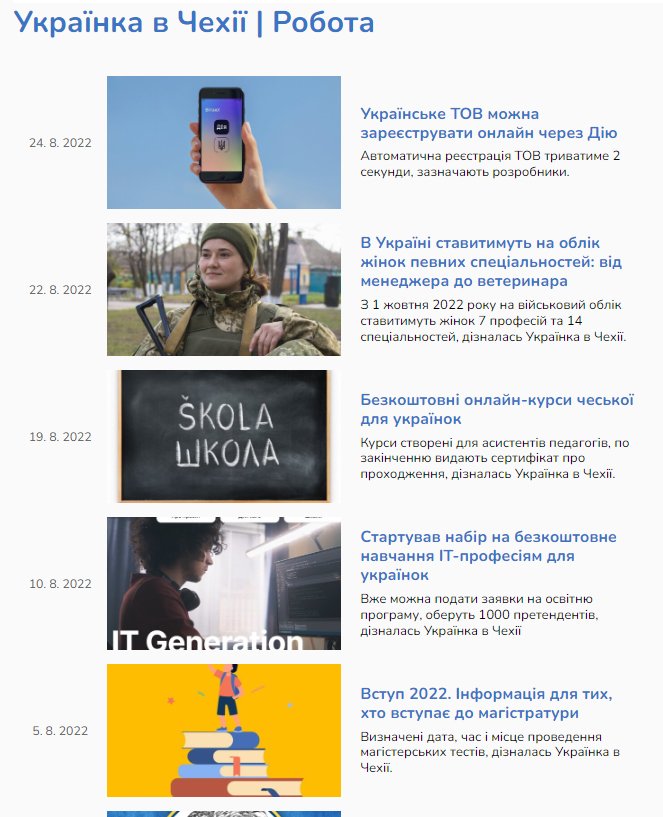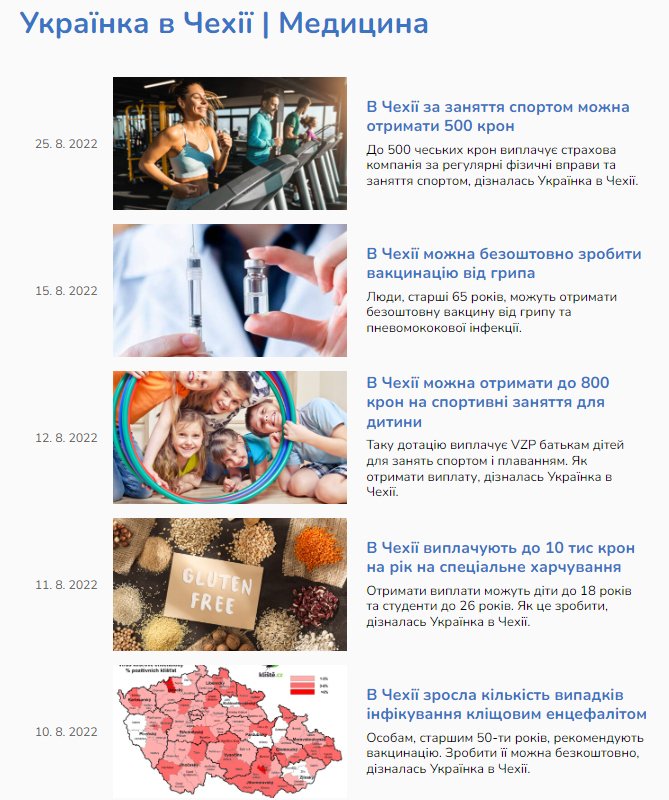Journalist, Editor, Playwright, Writer, Curator, Mother, Prague, Czech Republic
Oksana Maslova’s work earned my respect long before we got a chance to meet. Ms. Maslova is a Ukrainian go-getter in Prague, the woman behind the incredibly helpful to the refugees website called “Ukrainka in Czechia” which translates to “Ukrainian Woman in the Czech Republic”. The question 400,000 Ukrainians, who fled Russian bombs for the Czech Republic, are asking is “Now what?” Ms. Maslova has the answers and keeps digging for more life-saving information, collating it in one place.
As I clicked through Oksana’s website, I was amazed to see eight sub-categories outlining things like necessary visa filings, all-things-children, shelter and housing procurement, seeking work in the Czech Republic and navigating its medical system, understanding Czech customs and learning the language. It was heart-warming and heart-breaking for me as a Ukrainian, to read posts in the Cultural section of Oksana’s project; here the goal is to integrate women and children into the new society, while simultaneously detail locations of the protests against Russia, the oppressor, occupier, and the sole reason behind this unplanned and unwanted integration. Oksana’s website is the kind of place where a disoriented, new mother may find updated information and be able to join a support community of the like-minded Ukrainians. Oksana should know, she was that shell-shocked mother, back in March 2022, arriving in Prague with her daughter amid the confused masses.
Women like Oksana, who fled the terror caused by the Russian Federation, are currently acting as the ambassadors of Ukrainian strength, dignity, adaptability and progressive thought. Like many other proud Ukrainians, forced to leave their homeland, Oksana showcases Ukrainian culture with every opportunity, writing about her Odesa roots and squashing a myriad of lies continuously spawned by the Russian propaganda machine.
Ms. Maslova has a way with words; books, plays, essays, collections of poems under her belt. As a connector of people, Oksana enjoys organizing conferences, think tanks, and cultural exchange festivals. She asks the necessary questions and pours the knowledge out into Ukrainka in Czechia. Oksana’s contribution to helping her compatriots, specifically the distressed mothers, has been immeasurable; for that alone she will forever be a WOW Woman to me.
“Man is defeated only when he has abandoned all attempts and renounced himself.”
- by Carlos Castaneda, from The Teachings of Don Juan
1. Name
Oksana Maslova.
2. Where is your hometown?
Odesa, Ukraine.
3. What is your profession/career/title/self-label/designation? What does your average day look like?
I am a journalist, editor, communications specialist, playwright, writer, art project curator, festival organizer and a mother.
My day starts at 7 AM. The alarm clock is ringing. It's time to get up, make oatmeal, take a shower and tell my daughter what a wonderful day awaits her. Once in some book I read that this is how they woke up one of the characters. And I liked this idea so much that for five years now I have been waking my daughter up with that sentiment. Then gathering of her things commences, braiding her hair, talking about why trees are green and why people are the way they are. Why my eyes have one color and hers are different, what is a genotype and how the genes get transmitted. And now we are at the front door. We are off to school.
It's a lovely time to be going to school - the birds sing in the mornings, the sun shines, warming us on our walk. I bring my daughter to school, kiss her, and promise to pick her up early. As soon as the school’s front door closes, I take out my phone.
I call friends in Ukraine while I head back home, I collect the news from them. In fact, I know everything about the shelling while I cook the oatmeal because the messages on (a messaging service) Telegram are omnipresent. But a live conversation, with an alive person in Ukraine, is a treat these days. The road home is 10 minutes, so I make the most of it, making couple of short calls or one long one.
I come home and have my breakfast. I open the news and immediately look for news that are applicable for my project, “Ukrainka (Ukrainian woman) in the Czech Republic”. I check the chat feature on my site, delete any unnecessary messages, really happy to see how Ukrainian women help each other on the platform. My big focus is translating news from Czech into Ukrainian language, rewriting the news in an accessible for refugees language, and publishing. The numbers of readers is encouraging, each post has about 4,000 reads. The need in the community is strong; when I post five news articles a day, it amounts to twenty thousand views. At least six thousand subscribers are interested in my contributions on the ways of acclimatizing in the Czech Republic. I write about the information about schools, access to medical services, visa information, money and currency, activities for children; this is all geared for Ukrainian mothers, effectively single mothers in a foreign to them country.
I simultaneously like to focus on other projects and ideas; someone always offers something new to collaborate on, or fellow journalists ask me to talk about Ukrainka in the Czech Republic. I recently finished a book on the refugee experience, it is now in translation. The translator writes from time to time - to ask questions, to clarify. These amount to about five per day; time flies. It's interesting to see yourself through the eyes of others (as I’m answering these questions).
In parallel, I continue writing. New topics, new ideas. I just can't stop writing; I feel alive when I write. Only when I write, I am able to truly live. Ukrainian voices are now in demand, people are interested in our experience. I have been asked quite a bit, but had to pause my responses as I am focusing on writing a play. I feel like the process is fruitful, emotional and prolific.
When the news from Ukraine becomes emotionally overwhelming, I write poetry. The main thing is that I learned how to watch the news from Ukraine in doses. I do know about the air sirens, but unlike before, when I used to know about them in real time, I read about them a bit later. I no longer have to know about the falling bombs in real-time and call my mother immediately for a safety confirmation; I brought her out of danger and she is with me now, in Prague.
I read Telegram or Facebook for more friend updates, then I’m scanning the news again. I usually have a couple of meetings throughout the day, as I always take any opportunity to showcase Ukrainian culture to the Czechs and to the world at large. Pretty much everyone knows about the “excessive Russian culture” (which gave birth to rapists, murderers and marauders); I believe it is time to show the culture that gave birth to the heroes, Ukrainian defenders of not only their country, but of all democratic values.
Ukrainian culture -my passion for highlighting it and writing about it is the reason I'm looking for residences, grants, gallery spaces, writing letters, creating concepts and working with Ukrainian artists. Turns out it’s quite important for artists to know that their work is needed. I managed to literally return several back to the brush. I wrote one artist and asked him to show his new work. He answered: “I cannot draw or create when there is a war”. I asked, “You are an artist, what else do you think you can do to contribute? Your paints and brushes are your best weapons!” It worked. True, I had to remind him several times, but it worked.
As the day goes on, I look at the news again. News, news, news. Then it’s time to quickly cook dinner and run to pick up my kid from school. I promised sooner, didn’t I? To me it means not at the last seconds, but two minutes before the absolute last second. Every evening my daughter has an alternating art or dance class. Otherwise we enjoy our walks around the city. eat ice cream, ride the funicular or play on the playground. She is in the midst of her childhood; that cannot be paused.
4. What did you study in school?
I learned at school to read a lot, while at the same time to not shine too brightly. I adored biology for its logically established processes and literature for the wonderous storylines. I got interested in reading biographies, especially combined with studying accompanying works of the authors; the text immediately became so much richer. In general, all subjects came to me quite easily and at the end of my schooling I was awarded a gold medal. It was the “bankrupt 90s” though, so I later found out, to my great disappointment, that the medal was not really made of gold.
5. How is your life different from what you pictured at 20?
At the age of 20, I dreamed of having an office at a research institute, with my name on the door. After the literally hungry 90s childhood in the Soviet Union, and after reading dozens of science fiction books, becoming a researcher became firmly embedded in my brain as an ultimate career goal. As a side note, when my life indeed presented me with a name tag on the door, I refused; it became uninteresting the moment I achieved it.
I remember reading tales of artists living the bohemian life. I imagined what it would be like to be in an artist studio, to choose paintings for an exhibition or for a catalogue, I dreamed of going to the premieres. At the tender age of 5, I dreamed of understanding how everything worked and therefore bombarded adults with questions; absolutely everyone, regardless of their social rank. In that moment my mother’s fate was sealed too; she was destined to have many teacher-parent meetings, even during my kindergarten career. Turns out, my hopes and dreams at the time, as well as my curious questions have all greatly influenced future trajectory of my life. Even though I studied to become a biochemist, with two glowing diplomas, my future lay in combining the biochemistry of art and words.
6. Was there a time when life knocked you down or out and how did you get back up on your feet?
Complex question. Let's just say, many times it seemed to me that I was knocked down. But then it turned out that I could carry on living afterwards; only I was a slightly changed person. And, turned out, I wasn’t knocked out. I was different, but I was alive. As life tested me, I plunged into stress and saw clearer what I was made of, who I really was capable of being. I believe that stress removes everything superficial, including other people’s expectations. When you yourself have survived something significant, you want to contribute during the remainder of your life within your skills or physical abilities; oftentimes they are one and the same.
Am I grateful for life’s knockouts? Probably not. But most of what we suffer through can be added into an experience bank, so at the end it may be worth it.
7. Advice for other women?
I have always been a strong girl; who solved her own problems and never asked for any help. I’m talking here about rejecting help, never mind asking for it. Recent events in Ukraine, however, have shown how flawed and even harmful this personal philosophy is; not only to me but also to other people who are really trying to help us. I would advise women to accept help. Accept it with gratitude without harboring a sense of worthlessness, failure or guilt. If a person desires to help, he/she is able to do it and, moreover, wants to; sometimes with pleasure. Who are you to prevent another human from carrying out a good deed? Who are you to stop someone from assisting you? After you accept help, you become stronger, and in turn you will be able to better help others. Therefore, accepting help is an important part of the humanity’s cycle.
Well, I will say that the ability to accept help from other humans directly relates to your own ability to believe in others’ good intentions. I saw those who did not believe that they would be helped. I also saw those who closed their eyes, took a leap of faith into the unknown - and they were caught by the helping hands. I believe that each of us will jump with our eyes closed, sooner or later in life. It’s only a matter of time. The question is, at what stage of personal exhaustion and at what personal cost? After all, everything requires a certain level of trust, even receiving medical help.
8. Knowing what we know now in a current political climate, can women be "all that we can be" in today's world? What is the way forward, as you see it, for "feminist values"?
When the war in Ukraine started, I was forced to leave my hometown of Odesa with my child. My usual routines, gone. I realized how many freedoms were lost. Back in Ukraine, I formed a circle of personal support: my favorite friends and their lovely children, who played beautifully with my daughter. I had a network of people who could happily look after my child when I had to go to an important meeting and just work. Suddenly I found myself having to cook four times a day again, take my kid to various clubs, to school. This immediately robbed me of 30-40% of the time that I normally spent in Ukraine learning a new language, looking for new opportunities to advance myself and support my family.
The way forward, turns out, is letting go of your ideal self-image. Yes, I understand that I can do better. But at this point, it is more about knowing that theoretically than actually doing. I understand that each of my roles, if I focus on them, I can perform better; let’s say an improvement by 20 percent.
I’ve known intense feelings of desperate perfectionism, which inconveniently whispers “you need, can and will do this right”, but then the body simply refuses to comply and shuts down. It all came to a head when I started falling asleep on the public transport; that’s when I realized that something in my life had to change. I haven’t figured out what exactly should be the new balance yet, but I did start allowing myself time to rest. I think it's important for women to build self-care into their schedules on the same level of importance as shopping for groceries, picking up their kids from school, and putting their ideas into action.
9. Where in the world do you feel “tallest” (i.e. where is your happy place)?
You know, it happens to me quite often: I've visited somewhere it felt at the time like a happy personal place. And then when I’d come back, I wouldn’t feel that sensation again; quite the opposite, it would become unpleasant. I realized that there is no “happy place”, but a happy state. This happy state most often visits me in the parks and while I’m overlooking the water. How incredibly I miss the sea! I never gave the sea a second thought, nor understood its importance in my life. I grew up with a sea view, literally, in Odesa. From the windows of the apartment where I grew up, you can see the sea, green streets, and houses. Every day I walked past the sea - the road above or right on the beach.
During the summers, I’d swim every morning - swimming is good for the back, you see. Even in the autumn, winter or spring I’d make a detour by the sea, on my way to buy bread. It felt so natural – get some steps in, breathe fresh air, feed the seagulls and find some coloured glass for my friend, who makes beautiful jewelry out of it.
And now there is no sea. Of course it exists, but it continues to exist far from me. It turned out to be a very important piece of me. Maybe this is the place, with a breaking surf, which make me feel my tallest.
10. What do you want to be when you grow up? Future goals/challenges?
When I close my eyes, I see a lush green window, an antique writer's desk, and myself writing behind it. It's not really a plan or a goal. Just literally a month ago, I went on tours of the palaces of Prague, with their perfectly preserved décor. And I thought: what kind of stories can be written sitting in such a hall, with such a beautiful view? The thought has not left me. Does it look like a goal or a challenge? Don't know.
I’ve always wanted to make the world a little better. If you just explain, if you understand, if you convey. You could appreciate the innate value of every living being and every monument - nature, man or thought. If people understand each other, the world will become a little kinder. Life will become happier. There won’t be a need to waste mental resources on mistrust. This, of course, also cannot be called a goal. After all, goals should be qualitative, with deadlines and realizable end points. But it seems that I don't know how to live by the principles of SMART.
11. What fears are you still hoping to overcome?
That all I’ve done has been in vain. Sometimes I feel like everything I do is pointless. And then my hands double down with work, I'm afraid to stop. Many practitioners say that you need to stop, to appreciate what you create. That we must celebrate, we must be idle to enjoy creative wins. But I’m very afraid to stop. I am afraid that I’ll miss the train to something important in my life. I'm very afraid of this. Perhaps this is something worth working on.
12. Anything you'd do differently, if you had another go at life?
They say there is such a thing as karma. My understanding: we shape our own destiny. Beliefs give rise to thoughts, thoughts to actions, and actions give rise to your destiny. If I could do things differently, I would lay down some different core beliefs on key issues in my life. For example, new attitude toward oneself, the value of rest and even attitude toward men.
13. What/who inspires you?
At one point I admired Walt Disney; a man was once fired from a job for the cited “lack of imagination”. He changed jobs so many times, but did not enter a state of despair. He believed in himself and became a revolutionary force, creating an empire that allows children and adults to dream. He changed the world.
I am absolutely convinced that you can be inspired by and learn from almost every person you encounter. At some point you may encounter someone who uncovers a new way of thinking or introduces an interesting approach. Next thing you know, a head tilt.
14. What are you hopeful about?
I hope that the human across the aisle responds. That we will understand each other and are able to make this world a little warmer and more interesting. At least let’s have a good conversation right now, and perhaps create a wonderful project at a later point.
15. What are some ingredients to a good life? How did the global pandemic and the war in Ukraine change your perspective about the world, about your life, your goals and dreams?
A friend of mine recently said that success is when you have something to eat for breakfast. In the light of the war in Ukraine, unfortunately, this statement rings true. If we are talking about having a good life, then for me it has always been about freedom and safety.
To have a good life is to have the freedom to choose - from the trivial what to eat for breakfast to choosing which projects to focus on and pursue. Safety to me means no matter what choices I make (of course, taking into account common sense and criminal law), I am still safe. My adolescence was a difficult time. And a choice to one day walk through the park, to save a couple of dollars on bus fair, almost cost me my life.
The pandemic and the war in my country have only sharpened my deep understanding of what having a good life entails: time with my family and friends, their health and well-being, an easy and quick access to medical care and education, having ability to organize beautiful projects that change the world for the better. My little cherished things - from a vintage doll with porcelain legs to a scrap metal bird that my friend created for me, little things that help to fill my personal world with warmth.
16. What do you feel/understand/appreciate about Ukrainians and Ukrainian women in particular that you may not have realized before?
Before the war I did not appreciate (or notice) just how strong Ukrainian women are; they respond, lend a helping hand to strangers, even when they themselves need assistance. I read stories about how women took their children and those of strangers out of the war zone. How millions of women went to fight or connect people through logistical supply chains (connecting a friend of a friend to a certain initiative or a resource). Because of our women, much grass roots effort was carried out for our Ukrainian defenders, to clothe, feed and protect them.
17. What are (at least) three qualities you most love about yourself and why? What are your superpowers?
I don't think there are super strengths or super weaknesses. I believe there are certain character traits that are impossible to change, in yourself or in others. Even if you believe in the change or if collectively many people will for the change to occur. These innate qualities won’t change, but I believe that you can apply them in such a way that they benefit both you and the world.
For example, as a child, I very often heard: “Because I said so” and “Oksana, please be quiet” - from teachers, relatives, from so many people. Often it was, “stop sticking your curious nose into everything” and so on. I was very much affected by this, I was made to feel ashamed that I was constantly needing to know something, I needed to clarify and understand something, to ask. Then I was accepted into the school of journalism; turns out that this is just a super-power of a journalist. My superpowers were to delve into a topic to understand it better and ask a million questions. Probably, modern pediatricians would have diagnosed me with hyperactivity. But I felt pulled in different directions, with all my interests. But throughout my childhood, instead of harnessing my curiosity, I was continuously told “Oksana, pull yourself together, Oksana, focus. You can't do three things at the same time.” In the modern world, this is called multitasking and is especially highly valued in the field of project management. One of my friends said once that one month of my life would be enough activity for him to fill half a year.
For as long as I can remember, I have always been asked to be quiet: “Oksana, you talk too much. SHHH. You're talking too fast”. I could talk to complete strangers, have adults answering MY questions in no time, not the typical way around. My parents always received reproachful glances from others; it was a real torture for them to take me to work during the school holidays. Good that they worked in a large institute, and I quickly learned to move between offices with my curiosities and questioning manner. But then I remember being excited to tell them, at the end of the day, about the things I learned, to explain what I found out during my day of exploring. This may also have been unwelcome. It turns out that these qualities, if not squished in a child, come in very useful in the work of a journalist or a task manager.
And in general, I was surprised to learn at the age of 20 that, it turns out, I was nervous to walk on stage and share a story with an audience. A goal for me has always been to learn, first hand and through my own personal experience, all the smart things you hear people talk about on stage (from a Ted talk for example). I want to learn these things through life experience, and not just through reading about them, or watching them presented on YouTube.
20. What advice would you give your 14-year-old self? What advice would your 14-year-old self give you in return?
I would tell her that it will happen. It will surely happen for her. I would tell her not to worry so much about the reactions or words some people may have at her approaches. I would tell her that other people's reactions say more about them than about her.
I think a 14-year-old me would advise my older self to quickly invent a teleportation apparatus for her to use. For as long as I can remember, I always wanted to be somewhere instantly - and not waste time on a commute.
19. What are you reading now? (what books do you gift most and what are your favourite reads?)
I have several favorite authors that I can turn to when I need some uplifting: Roger Zelazny, Stanisław Lem and Max Frei (the pen name of Svetlana Yuryevna Martynchik).
Zelazny impresses me for the ease with which he creates magical worlds with completely real everyday people.
After reading Stanisław Lem's autobiography, I began to seek, with particular passion, references to his childhood and youth and looking up his later works.
Max Fry is such a mixture of a philosophical treatise with fantasy. Very easy to read.
Right now, I am perusing a catalog of fans created by the Odessa Museum. Because it's beautiful.
20. Who is a WOW WOMAN in your world who inspires you and why? Can you nominate three (or more) women you know who perfectly fit WOW WOMAN description? What would you tell them, if you had an opportunity, about why you admire them?
I don't have idols. I often see WOW in a woman. I think every woman is WOW in a different way. For example, the editor-in-chief of Harper’s Bazaar in the Czech Republic, Nora Grundova. An incredibly fragile and graceful-looking woman who creates one of the most intelligent publications I have ever read. The stories inside are very interesting. Nora is very busy, but absolutely, absolutely always she is so put together, as if always on the way to a fashion photo shoot. In addition to all her other amazing qualities, I’m incredibly amazed by this ability (of any woman) to throw an outfit together effortlessly. This evokes in me a sense of WOW.
Director of the Czech Center Kyiv, Radka Rubilina - she is so wow-energetic. She is involved and personally cares about the members of the center. I don't know how it is possible to become such an empathic supporter for someone whom you see for the first time and may be for a short period of time. When we spoke, it was under stressful circumstances. She is WOW.
Edith Eva Eger, who is almost 100 years old, she went through a fascist concentration camp and now works as a psychotherapist, writes books. When I transcribed her speech for the BookForum Literary Festival, every time I paused and said to myself: WOW! I'm sure that much of what Edith wrote about ended up helping me cope with the understanding of the horrors that the Russians are now carrying out in Ukraine.
21. Where can others find you/your work (links to websites, blogs, etc.)
Here you can find the project Ukrainka in the Czech Republic website and a telegram channel: @ukrainka_in_Czech.
In addition, now my book is being prepared for publication in the Czech publishing house Euromedia.
1. Where were you when the attack happened? Did you believe in the possibility of RF attacking Ukraine's key cities and proceeding with the full-on aggression?
I was at home. In my bed.
As for believing, we were all reading the news. Until the last moment I wanted to believe that there would be no escalation beyond the East. Many perceived the media reports as some sort of information war, a pressure put on by the various sides.
2. What was your experience of the day the war started? Where did you go and what do you recall was your plan?
Horror. But the most horror came much later. The first thing I did was I collected my documents, laptop, warm clothes, food and water and started looking for evacuation routes. As the strikes were reported throughout entire Ukraine, it was difficult not to interpret the new reality of war.
3. How are your family and friends doing? How often are you in touch?
Many girlfriends with children have evacuated throughout various countries. I have friends who are fighting at the front, who are in the territorial defense, some continue to teach students, some continue to create art and put on performances. But practically everyone volunteers, collects and delivers needed, for the front, items and medicine. Many donate to the freedom cause.
4. What was your journey out of Ukraine like?
Very difficult. Initial days of panic. Panic and minimum organization for the masses of people. There were incredibly long queues at the border.
5. What are some ways you are supporting Ukraine now, from abroad?
I create projects, here in Czech Republic, to support Ukrainian women who fled Russian aggression. I also try to introduce Ukrainian culture to the locals here in Czech Republic. It’s catastrophic how little people know about it. Yet it’s the culture that raised heroes who in this very moment are defending their land. Ukrainians are not just defending their own country against the Russians, they are defending the entire world.
6. What do you want the world to know about Ukrainians during this difficult time? About Ukrainian Women?
Everyone seems to connect with and absorb something different from this war. And that’s the point. I see how people in other countries are surprised at how talented and hardworking we are.
7. What will be the first thing you'll do when Ukraine wins?
I will hug my friends. And I'll start organizing a new festival.
Bonus Quick Round Qs:
1. What and who is worth suffering for? Suffering creates suffering. I think no one should suffer out of duty. On the other hand, everything in this world is cause and effect. So, we are doomed to suffer.
2. What would you do if you knew that nobody would judge you? You know. My daughter, when asked what your mother likes to do most in the world, answers: Mom loves to sleep. And this gives people a completely misleading impression of me.
So, if no one is watching, I'd probably go to bed. With a laptop. And I will find some incredibly interesting project there, which I will immediately begin to implement together with the like-minded people.
3. Who is/are your mentor/s (these could be men or women in your life)? I don't have a mentor in the true sense of the word. From time-to-time life brings me people who are really wow. And I try to remember each meeting as accurately and in detail as possible - because the most wow thing in a person is his or her way of thinking, her beliefs. And it is these basic things that should be analyzed and adopted.
4. If you didn't have to work anymore what would you do with your days? I would people watch, I would travel the world just to see how people live. I would listen to them and talk to them. And then I would describe it all. There is nothing more interesting in this world than how and why a person thinks. How thoughts turn into actions, and actions form life and the world around us.
5. If you could be anyone for a day, who would you be? Every day I would be a new person. If it were possible to simply start from zero every day, and of course write off all the health risks, then I would take up ballet, skydiving, deep-sea diving. I would want to be a beloved woman. However, the last - I would like to be every day. To be a beloved woman who is surrounded by care, support, attention and love. I don’t know yet how this would combine with my craving for independence and love of freedom, but...
6. If you could relive one year in your life, which one would it be? It will probably be some future, next year. Because every year is special. Sometimes I feel like my year would be better if this or that event never happened. But then I realize how all the occurrences of the year have shaped my attitude to life.
7. What bothers you most about people? What do you love most about people? In other people I love just that, humanity. I love openness, sincerity, intelligence, talent, kindness, responsiveness, love of life. I get very tired of people who lie, who calculate their options and smile at you when it suits them; then do not notice you when they don’t find any further use for you. Then, all of a sudden, they smile again and try to signal friendship. Last time I checked, nobody canceled the law of conservation of energy - energy does not appear from nothing and does not disappear into nothing, it is transformed. I love people who understand this concept.
Работа Оксаны Масловой заслужила мое уважение задолго до нашего знакомства. Г-жа Маслова — украинский деятель в Праге, женщина, стоящая за невероятно полезным для беженцев веб-сайтом под названием «Ukrainka in Czechia». Вопрос который 400000 украинцев, бежавших в Чехию от российских бомб, задают сами себе: «Что теперь?» У г-жи Масловой есть ответы, и она продолжает искать дополнительную жизненно важную информацию, сопоставляя ее в одном месте.
Просматривая веб-сайт Оксаны, я была поражена, увидев восемь подкатегорий, описывающих такие вещи, как необходимые документы для получения визы, все, что связано с детьми, приют и приобретение жилья, поиск работы в Чешской Республике и навигация по ее медицинской системе, понимание чешских обычаев и изучение языка. Мне как Украинке было тепло и душераздирающе читать посты в разделе «События»; здесь цель состоит в том, чтобы интегрировать женщин и детей в новое общество, одновременно детализируя места протестов против угнетателя и оккупанта - причину этой незапланированной и нежелательной интеграции.
Сайт Оксаны — это место, где растерянная новоприбывшая мама может найти четкие ответы и присоединиться к сообществу поддержки других украинских женщин-единомышленниц. Оксана знала бы, она была той контуженной матерью, которая в марте 2022 года прибыла в Прагу со своей дочерью, среди растерянных масс.
Такие женщины, как Оксана, бежавшие от террора, вызванного Российской Федерацией, в настоящее время выступают в качестве послов украинской силы, достоинства, прогрессивного мышления и инноваций. Как и многие другие гордые Украинки, вынужденные покинуть свою родину, Оксана при любой возможности демонстрирует украинскую культуру, пишет о своих Одесских корнях и подавляет любую ложь, постоянно просачивающуюся из российской пропагандистской машины.
Г-жа Маслова владеет словом; книги, пьесы, очерки, сборники стихов за ее плечами. Будучи связующим звеном между людьми, Оксана любит организовывать конференции, аналитические центры и фестивали культурного обмена. Она задает необходимые вопросы и изливает знания в «Украинка в Чехии». Ее вклад в улучшение жизни своих соотечественников, особенно матерей, находящихся в бедственном положении, безусловно, неизмерим; и за это она навсегда останется для меня WOW-женщиной.
“Человек побежден лишь тогда, когда он оставил всякие попытки и отказался от самого себя.”
- Цитата из книги «Учение дона Хуана»
1. Ваше имя.
Оксана Маслова.
2. Где ваш родной город?
Одесса, Украина.
3. Какова ваша профессия / карьера / титул / самоклейка / обозначение?
Я журналистка, редакторка, специалист по коммуникациям, драматург, писательница, кураторка арт-проектов, организатор фестивалей и мама.
Мой день вначинается в 7 утра. Звонит будильник. Пора вставать, варить овсянку, принимать душ и рассказывать дочери, какой прекрасный день ее ждет. Однажды в какой-т окниге я прочитала, что именно так будили одного из персонажей. И мне так понравилась эта идея, что вот уже лет пять я так ее бужу. Потом сборы, заплетание косы, разговоры о том, почему деревья зеленые и как люди выбирают жизненные стратегии. Почему у меня глаза одного цвета, а у нее другого. Что такое генотип и как передаются гены. И вот мы уже на пороге дома. Я закрываю дверь и мы идем в школе. Сейчас очень здорово ходить в школу - птицы сутра поют, солнце светит, местами даже пригревает. Я довожу ее до школы, целую, обещаю забрать раньше. Как только двери закрываются, достаю телефон. Я звоню друзьям в Украине, пока иду домой - узнаю новости. На самом деле, все об обстрелах я знаю еще пока варю овсянку - телеграм он вездесущий. Но поговорить живым голосом с живым человеком - каждый раз это настоящий праздник. Дорога домой -10 минут. За это время я успеваю сделать пару коротких звонков или один длинный.
Прихожу домой и завтракаю. Открываю новости и начинаю искать новости для проекта Украинка в Чехии. Проверяю чат - удаляю ненужные сообщения, радуюсь, когда вижу как украинки помогают друг другу. Перевожу новости с чешского на украинский, переписываю доступным языком, публикую. Первое время смотрю на цифры - цифры радуют. У каждого поста - около 4 тысяч прочтений. 5 новосте в день - это 20 тысяч просмотров. Это минимум 6 тысяч подписчиков немного более спокойны и владеют нужной информацией: школы, медицина, виза, деньги, и куда сходить с ребенком.
Потом начинают писать по проектам - кто-то предлагает что-то новое делать. Или пишут колеги-журналисты - просят рассказать об Украинке в Чехии. Я недавно закончила книгу об опыте беженства, сейчас она в переводе. И переводчик время от времени пишет - задать вопросы, уточнить. В день выходит до 5 уточнений. Это интересно - смотреть на себя чужими глазами. Я отвечаю на такие вопросы, о которых никогда бы и не задумывалась.
Паралельно пишу новый текст. Я просто не могу не писать. Я чувствую себя живой, когда пишу. Только когда пишу - по-настоящему живой. Сейчас спрашивают тексты украинцев. И меня часто спрашивали, но я была вся посвящена книге и колонкам. Пока пауза, пишу пьесу. Добротная выходит. Мне нравится, эмоциональная.
Когда совсем сложно - пишу стихи. Главное, я научилась дозированно смотреть новости из Украины. Я четко знаю, когда сирены - но уже после. Мне теперь не надо сверяться с приложением и звонить маме. Мама теперь в безопасности.
Стоит залезть в телегу или фб - смол толки с друзьями. Потом опять новости. И как правило пару встреч - ищу возможности показать украинскую культуру. Практически весь мир знает о “великой русской культуре”, которая породила насильников, убийц и мародеров. Пришло время показать культуру, которая породила героев. Героев, которые защищают сейчас не только свою страну, а все демократические ценности, которые в США принято считать основой. Украинскую культуру. Потому я ищу резиденции, гранты, галереи, пишу письма, создаю концепции, работаю с художниками. Оказалось. Художникам очень важно знать, что их работы нужны. Парочку мне удалось буквально вернуть к кисти. Я написала и спросила - покажи новые работы. А он ответил: я не могу рисовать, когда война. И я спросила: ты художник, что по-твоему ты можешь сделать? Твои краски и кисти - твое лучшее оружие. Так поставь его на службу родным, родной стране. И это сработало. Правда, повторять пришлось нсеколько раз.
Потом снова новости, новости, новости. Потом быстро готовить обед и бежать забирать ребенка со школы. Обещаю раньше. Потому забираю не в последнюю минуту, а за 2 минуты до. Каждый вечер у нее либо арт-классы или танц-классы. Или мы ходим гулять по городу. Едим мороженое, катаемся на фуникулере, играем на детской площадке. У нее детство. Его нельзя ставить на паузу.
4. Что вы учили в школе?
Я училась в школе много читать и не отсвечивать. Обожала биологию за логику процессов и литературу за сюжетные линии писателей. Чиать биографии оказалось весьма увлекательным занятиям, особенно в сочетании с произведениями. Сразу так богаеч становился текст. А вообще мне все преметы давались довольно легко и в конце обучения мне вручили золотую медаль. Это были голодные 90-е и моему разочарованию не было предела, когда я поняла, что медаль совсем не из золота.
5. Как ваша жизнь отличается от того, что вы думали в 20 лет? И сейчас?
В 20 лет я мечтала иметь кабинет в исследовательском институте с табличкой с моим именем на двери. После голодного детства в 90-х и десятков книг по научной фантастике, этот образ накрепко вошел в мою голову. Интересно, что когда в моей жизни, действительно, появилось предложение поставить табличку именную, то я от нее отказалась. Стало неинтересно.
Где-то сильно вглубине себя, еще до 20 лет. Я зачитывалась историями художников, о богемной жизни. Представляла, каково это - оказаться в мастерской художника. Каково это -выбирать картины для выставки и для каталога. Мечтала ходить на все премьеры. А в 5 лет я мечтала понять, как все устроено и потому засыпала взрослых вопросами. Причем абсолютно всех, независимо от ранга, из-за этого мама имела разговоры в садике. И вот оказалось, что эти мечты, самые первые, вот они очень повлияли на мою жизнь.
Я выучилась на биохимика, с двумя красными дипломами и всю жизнь занимаюсь биохимией искусства и слова.
6. Было ли время, когда жизнь сбила вас с ног или как вы поднялись на ноги?
Сложный вопрос. Скажем так, мне много раз казалось, что это именно так. Но потом оказывалось, что можно жить. По-другому, но можно. И чем чаще жизнь выбивала почву из-под ног, чем больше я погружалась в стресс, тем яснее я понимала, что и кто я есть. Ведь стресс снимает все наносное, все чужие ожидания, навязанные ожидания от твоей жизни. Когда ты сам выжил, то делаешь то, на что способен или то, что можешь. И часто это оказывается одним и тем же. Благодарна ли я за такие удары? Скорее нет. Но большинство из того, что мы переживаем можно превратить в опыт. Это требует определенных навыков и усилий. Но оно того стоит.
7. Совет для других женщин?
Я всегда была сильной девочкой. Девочкой, которая сама решает свои проблемы и никогда не просит о помощи. Не то что не принимает помощи, даже не просит о ней. Последние события показали, насколько эта стратегия ущербна и даже вредна - не только мне, но и другим людям. Которые, действительно, пытаются помочь. Я бы посоветовала женщинам принимать помощь. Принимать с благодарностью. Без ощущения собственной никчемности или долга или вины. Если человек помогает, он способен это сделать и, более того, хочет это сделать. Кто ты такая, чтоб мешать другому совершить доброе дело? Кто ты такая, чтобы помешать кому-то помочь тебе? Став сильнее, ты сможешь помочь другим. Потому принимать помощь - это важная часть возможности помочь другим.
Ну и способность принимать помощь напрямую зависит от способности поверить. Я видела тех, кто не верит, что им помогут. И видел тех, кто закрыл глаза и совершил прыжок веры - и их поймали. Вся штука в том - что каждая из нас прыгнет, закрыв глаза, рано или поздно. Вопрос - на какой грани истощения вы окажетесь в этот момент. Даже получить медицинскую помощь - это про доверие.
8. Зная, что мы знаем сейчас в нынешнем политическом климате, могут ли женщины быть «всем, чем мы можем быть» в современном мире? Как продвигается, как вы понимаете, «феминистские ценности»?
Когда началась война и я была вынуждена вместе с ребенком покинуть родной город, привычные рутины, я осознала, сколько свобод я потеряла. У меня был сформированный круг личной поддержки - мои любимые друзья. Их прекрасные дети, которые весело играли с моим ребенком. Люди, которые могли присмотреть за моим ребенком, когда мне нужно было отправиться на важную встречу да и просто поработать. Я внезапно оказалась перед необходимостью снова готовить 4 раза в день, водить на кружки, в школу. Это лишает меня 30-40% времени, которые я могла бы потратить на изучение нового языка или поиск перспектив или реализации идей.
Путь вперед - это отказаться от представлений о себе идеальной. Да, я понимаю, что я могу лучше. Но это скорее про able, чем про реальный can. Я понимаю, что каждую из своих ролей, если на них сосредоточиться, я могу реализовать лучше, процентов на 20, так точно. И периодически меня укрывали волны отчаянного перфекционизма - который услужливо подсовывал мне картинку “ты способна сделать так”, а тело просто отказывалось и отключалось. Когда я начала засыпать в трамваях, я поняла, что надо что-то менять. Пока не придумала что, но начала себе давать время для отдыха. Думаю, важно женщинам встроить заботу о себе в график на том же уровне важности, как покупка продуктов, забрать ребенка из школы и реализовать свои идеи.
9. Где в мире вы чувствуете себя «самым высоким» человеком (т. е. Где ваше счастливое место)?
Знаешь, у меня бывает такое - я где-то была, мне кажется - там счастливое место. А потом возвращаюсь - и не чувствую. И даже как-то неприятно становится. И я поняла, что нет счастливого места, есть счастливое состояние. Хотя чаще всего оно меня посещает в парках и с видом на воду. Сейчас я очень скучаю по морю. Невероятно. Я никогда не задумывалась о том, какое море имеет значение в моей жизни. Я выросла с видом на море, буквально. Из окон квартиры, где я росла, видно море и зеленые улицы, и дома. Каждый день я ходила мимо моря - сверху или ближе. Летом каждое утро приходила на пляж покупаться - потому что плавание полезно для спины. Шла осенью, зимой или весной за хлебом - делала крюк, чтоб пройтись по пляжу. Это было так само собой - нашагать шаги нужные, подышать воздухом, покормить чаек, найти стеклышек для моей приятельницы, которая делает из них украшений. А сейчас моря нет. То есть оно есть, конечно, но очень далеко от меня. И, оказалось, это очень важно. Может, где-то со звуком прибоя - это место, о котором ты спрашиваешь.
10. Чего вы хотите добиться, когда достигнете зрелого возраста? Будущие цели / задачи?
Когда я закрываю глаза, я вижу окно с буйной зеленью, старинный писательский стол и себя, пишущей. Это не то чтобы план или цель. Просто буквально месяц назад я ходила эксркусиями по дворцам Праги, с ее сохранившимся убранством. И подумала: это же какие истории можно написать, сидя в таком зале. С таким видом из окна. И с тех пор эта мысль меня не покидает. Похоже это на цель? Не знаю. Мне всегда хотелось сделать мир немножечко добрее. Мне казалось, что если объяснить, если понять, если донести. Если увидеть ценность каждого живого существа и каждого памятника - природы, человека, мысли. Если люди поймут друг друга, то мир станет немножечко добрее. Жить станет радостнее. Не надо будет тратить ресурсы на недоверие. Это, конечно, тоже не цель. Ведь цели должны быть измеримыми, с дедлайнами и реализуемыми. Но, похоже, я не умею жить по SMART
11. Какие страхи вы все еще надеетесь преодолеть?
Что все зря. Иногда мне кажется, что все, что я делаю - это зря. И тогда у меня опасаются руки. Я боюсь остановиться. Все помогающие практики говорят, что надо останавливаться. Надо ценить то, что создаешь. Надо праздновать, надо бездельничать. А я очень боюсь остановиться. Я очень боюсь не успеть чего-то важного в своей жизни. Очень боюсь этого. Возможно, именно с этим стоит поработать.
12. Что бы вы сделали по-другому, если бы вы начали жизнь с самого начала?
Говорят, есть такая штука как карма. В моем понимании мы тоже формируем свою судьбу сами. Убеждения рождают мысли, мысли действия, а действия ту самую судьбу. Если б я могла что-то сделать по-другому, я бы заложила некоторые другие убеждения по ключевым вопросам. Например, про отношение к себе, отношение к отдыху, отношения к мужчинам.
13. Что вас вдохновляет?
Когда-то я восхищалась Уолтом Диснеем. Человека выгнали с работы за недостаток воображения, он сменил столько мест работы, но не отчаился, верил в себя и стал революционером. Он создал империю, которая дарит детям и взрослым мечты. Создал империю, которая изменила весь мир.
Я абсолютно уверена, что вдохновиться и научиться можно практически у каждого встреченного человека. Где-то это тип мышления, где-то - интересный подход, где-то формулировки, где-то отношение к жизни, а где-то наклон головы.
14. На что вы надеетесь? (Каковы ваши надежды и мечты для себя и для других)?
Я надеюсь, что человек напротив откликнется. Что мы поймем друг друга и сможем сделать этот мир немножечко теплее, интереснее и как минимум неплохо пообщаемся прямо сейчас, а, возможно, и создадим прекрасный проект прямо потом.
15. Каковы некоторые ингредиенты для хорошей жизни? (Если «хорошая жизнь» была рецептом?). Как глобальная пандемия и война в Украине изменили ваш взгляд на мир, на вашу жизнь, ваши цели и мечты?
Один мой друг недавно сказал, что успех - это когда у тебя есть что позавтракать. И в условиях войны в Украине, к сожалению, это действительно так. Если говорить о хорошей жизни, то для меня это всегда был вопрос свободы и безопасности. Хорошая жизнь - это иметь свободный выбор в своих действиях - начиная от выбора того, что есть на завтрак и продолжая выбором того, с какими проектами работать и в какое время. Безопасность - это какой бы выбор я не совершила (конечно, с учетом здравого смысла, криминального и даминистративного права), я все равно нахожусь в безопасности. Мой подростковый период пришелся на сложное время. И однажды выбор сэкономить и пройтись несколько остановок пешком через парк, вместо того, чтобы заплатить за проезд в троллейбусе, чуть не стоил мне жизни.
Пандемия и война только заострили для меня понимание хорошей жизни: время с моими родными и близкими, их здоровье и благополучие, легкий и быстрый доступ к медицинской помощи и образованию, возможности организовывать красивые проекты, которые меняют мир к лучшему. Мои маленькие мелочи - от винтажной куклы с фарфоровыми ножками до птицы из металлолома, которую сварил мой друг - которые помогают наполнить мой личный мир теплотой.
16. Что вы чувствуете/понимаете/цените в украинцах и украинских женщинах чего вы, возможно, не осознавали раньше (до войны)?
Раньше я не знала, какие украинские женщины сильные. Как женщины отзываются и протягивают руки помощи незнакомым людям, даже когда сами нуждаются в этой помощи. Я читала истории о том, как женщины вывозили своих и не своих детей из зоны военных действий. Как миллионы женщин пошли воевать или выстраивать логистические цепочки - собирать нужное для украинских защитников.
17. Какие (перечислите как минимум три) качества вы больше всего любите в себе и почему? Какие у вас суперспособности?
Я не думаю, что есть супер-силы или супер-слабости. Просто есть черты характера, которые ты не сможешь изменить. Даже если захочешь. Даже если все вокруг тебя очень сильно захотят. Но ты всегда сможешь их применить так, чтоб они принесли пользу и тебе, и миру.
Например, в детстве я очень часто слышала: “Потому” и “Оксана, помолчи пожалуйста” - от учителей, родных, от многих людей. Нередко прилетало “любопытной варваре на базаре нос оторвали” и прочее. И я очень сильно тяготилась этим - тем, что я постоянно хочу узнать, уточнить, спросить. А потом я попала в школу журналистики - и оказалось, что это просто супер-сила журналиста: вникать, разбираться, задавать вопросы.
Наверное, современные педиатры поставили бы мне в детстве диагноз - гиперактивность. Это очень непросто, когда тебя тянет в разные стороны. И я часто слышала: Оксана, соберись, Оксана, сфокусируйся. Нельзя заниматься тремя делами одновременно.
В современном мире это называется мультизадачность и особенно высоко ценится на ниве управления проектами. Один мой друг сказал, что одного моего месяца жизни ему хватит на полгода.
Сколько себя помню, меня всегда просили помолчать: Оксана, ты слишком много говоришь. Ты слишком быстро говоришь. Я могла разговаривать с совершенно незнакомыми взрослыми, причем на вопросы отвечали они, а не я. В детстве родители все время получали укоризненные взгляды, а взять меня на работу в дни каникул для них было настоящей пыткой. Хорошо, что они работали в большом институте, и я быстро научилась перемещаться между кабинетами со своим любопытством. Но потом же мне хотелось это все рассказать - объяснить, что я узнала, как оно работает, почему именно так. Какие еще есть варианты. Оказывается, это очень полезно в работе журналиста и постановщика задач. Да и вообще я с удивлением узнала лет в 20, что, оказывается, можно бояться выйти на сцену и что-то рассказать. Для меня всегда самой большой загадкой было - как узнать все то умное, что обычно рассказывают со сцены. Причем запомнить, а не прочитать по бумажке.
18. Какой совет вы бы дали себе в 14 лет?
Я бы сказала ей, что у нее получится. Вот обязательно получится. Только не надо так сильно переживать по поводу реакции некоторых людей. Реакция людей больше говорит о них самих, чем о тебе.
Я думаю, 14-летняя я посоветовала бы себе поскорее изобрести аппарат по телепортации. Сколько себя помню, всегда хотела мгновенно перемещаться - и не тратить время на дорогу.
19. Что вы сейчас читаете? (какие книги вы подарите больше всего и какие ваши любимые чтения?)
У меня есть несколько любимых авторов, к которым я возвращаюсь, когда надо себя поддержать: это Желязны, Лем и Макс Фрай. Желязны мне импонирует за то, с какой легкостью он создает волшебные миры с совершенно живыми людьми. Прочитав автобиографию Лема, я с особым азартом принялась искать отсылки к его детству и юности в поздних произведениях. А Макс Фрай - это такая себе смесь философского трактата с фентези. Очень легко читать.
Прямо сейчас я читаю каталог вееров, созданный одесским музеем. Потому что это красиво.
20. Кто такая женщина WOW в вашем мире, которая вдохновляет вас и почему? Можете ли вы назначить трех (или более) женщин, которых вы знаете, которые отлично подходят для WOW WOMAN? Что бы вы сказали им, если бы у вас была возможность, почему вы восхищаетесь ими?
У меня нет кумиров. Я часто вижу в женщине Вау. Я думаю, каждая женщина по-своему Вау. Например, шеф-редактор Харперс Базаар в Чехии Нора Груднова. Невероятно хрупкая и изящная на вид женщина, которая создает один из самых интеллектуальных глянцевых журналов, которые мне доводилось видеть. При этом материалы очень интересны, Нора очень загружена, но абсолютно, абсолютно всегда она выглядит так, словно торопится на модную фотосесссию. Кроме всех ее прочих потрясающих качеств, вот это умение подобрать наряд и аксессуары неизменно вызывают у меня ВАУ.
Директор Чешского центра Киев Радка Рубилина - она настолько вау-энергична. Она настолько вникает в проблему и настолько лично поддерживает резидентов. Я не знаю, как можно за минимальный период времени стать поддержкой для человека, которого ты видиш впервые. Причем еще в настолько стрессовой ситуации, в которой мы впервые позвонились. И это вау
Эдит Эва Эгер, которой почти 100 лет, она прошла фашистский концлагерь и сейчас работает психотерапевтом, пишет книги. Когда я расшифровывала ее выступление для литературного фестиваля БукФорум, я каждый раз ставила на паузу и говорила себе: вау! Мне кажется, нет, я уверена, что многое из того, что она тогда сказала, помогает мне справляться с восприятием того ужаса, который сейчас творят россияне в Украине.
23. Где другие могут найти вас / вашу работу (ссылки на сайты, блоги и т. д.)?
Здесь можно найти проект Українка в Чехії;
Telegram: Українка в Чехії
Кроме того, сейчас в чешском издательстве Евромедиа готовится к публикации моя книга.
!Вопросы к украинкам!
1. Где вы были, когда произошло нападение?
Я была дома. В своей кровати.
Вы верили в возможность нападения РФ на ключевые города Украины и продолжения полномасштабной агрессии?
Мы все читали новости. До последнего хотелось верить, что дальше Востока эскалации не будет. Многие воспринимали происходящее в медиа как этап инфррмационной войны, давление.
2. Что вы пережили в тот день, когда началась война? Куда вы пошли и каков, как вы помните, был ваш план?
Ужас. Но он сильно позже подошел. Первое, что я сделала - собрала документы, лэптоп, теплую одежду, продукты и воду и начала искать пути эвакуации. Потому что удары по всей Украине уже сложно было не трактовать как войну.
3. Как поживают ваша семья и друзья? Как часто вы на связи?
Многие подруги с детьми в эвакуации в разных странах. Друзья кто но фронте, кто в теробороне, кто продолжает учить студентов , кто ставит спектакли. Но практически все волонтерят, собирают и ищут важные предметы и лекарства, донатят.
4. Каким было ваше путешествие из Украины?
Очень сложным. Это были первые дни. Паника, минимум организации и очереди на границе
5. Как вы сейчас поддерживаете Украину из-за рубежа?
Я создаю проекты для поддержки местных беженок из Украины. А также стараюсь знакомить с культурой Украины. О ней катастрофическмюи мало знают. А ведь это культура, которая взрастила героев, которые сейчас защищащают не только свою страну от россии , но и весь мир.
6. Что вы хотите, чтобы мир знал об украинцах в это непростое время? Об Украинках?
Каждый узнает что-то свое. И это главное. Я вижу, как люди в других странах удивляются , насколько мы талантливы и насколько трудолюбивы.
7. Что вы сделаете в первую очередь, когда победит Украина?
Я обниму своих друзей. И начну работать над новым фестивалем.
Бонусные вопросы быстрого раунда:
1. За что и ради кого стоит страдать? Страдания создают страдания. Я думаю, никто не должен от слова долг страдать. С другой стороны, все в этом мире - причины и следствия. Так что мы обречены страдать.
2. Что бы вы делали, если бы знали, что вас никто не осудит? Знаешь. Моя дочь, когда ее спрашивают, что больше всего на свете любит делать твоя мама, отвечает: мама любит спать. И это формирует у людей совершенно обманчивое обо мне представление.
Так что, если никто не будет смотреть, я, пожалуй, лягу спать. С ноуубуком. И найду там какой-нибудь невероятно интересный проект, который тут же начну реализовывать вместе с единомышленниками.
3. Кто ваш ментор (могут быть, например, определенные мужчины или женщины в вашей жизни)? У меня нет ментора в прямом понимании этого слова. Время от времени жизнь сводит с меня людьми, которые, действительно, вау. И я стараюсь максимально точно и детально запомнить каждую встречу - потому что самое вау в человеку - это его способ мышления, убеждения. И именно эти базовые вещи стоит анализировать и перенимать.
4. Если бы вам больше не нужно было работать, чем бы вы занимались в свободное время? Я буду наблюдать за людьми, я буду ездить по миру и смотреть, как люди живут. Я буду слушать их и говорить с ними. А потом буду все это описывать. Нет ничего более интересного в этом мире чем то, как и почему мыслит человек. Как мысли превращаются в действия, а действия формируют жизнь и мир.
5. Если бы вы могли быть кем угодно на один день, кем бы вы были? Каждый день я была бы новым человеком. Если б можно было каждый день просто помножить ноль -и в первую очередь, именно списать все риски для здоровья. То я бы занялась балетом, прыжками с парашютом, глубоководным нырянием. И любимой женщиной. Впрочем, последнее - я бы хотела каждый день. Быть любимой женщиной, которую окружают заботой, поддержкой, вниманием и любовью. Не знаю пока, как это сочетается с моей тягой к независимости и свободолюбием, но.
6. Если бы вы могли заново пережить один год своей жизни, какой бы это был? Наверное, это будет какой-то следующий год. Потому что каждый год - он особенный. Иногда мне кажется, что лучше б этого никогда не происходило. А потом я понимаю, насколько то или иное событие сформировало мое отношение к жизни.
7. Какие качества вы больше всего не переносите в других людях? Что вы больше всего любите в других людях? Я люблю в других людей - людей. Открытость, искренность, ум, талант, доброту, откликаемость, любовь к жизни. Меня очень утомляют люди, которые лгут, которые расчетливо сверяют варианты и улыбаются тебе, когда им это выгодно и не замечают тебя, когда не видят от тебя толк. А потом снова улыбаются и пытаются выглядеть друзьями. Закон сохранения энергии никто не отменял - энергия ниоткуда не появляется и никуда не исчезает, она трансформируется. Я люблю людей, которые это понимают.

